#MarcusScott
Text
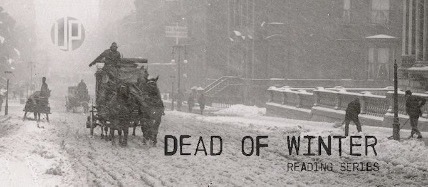
Dev Bondarin is directing a reading of my kitchen-sink dramedy TUMBLEWEED with the UP Theater Company (www.uptheater.org). The reading will take place on Sunday, January 21st at 3pm at Ft. Washington Collegiate Church located at 729 W. 181st St. (1 train to 181st).
Kirby Fields, artistic director of the UP Theatre Company recently spoke with the Manhattan News recently about their Dead of Winter series: ‘Fields says it is particularly gratifying to establish relationships with writers. Marcus Scott, who wrote the third play in the series, “Tumbleweed,” came to a staged reading last year. Then he sent Fields a number of his own plays.
“This guy is just bursting with ideas,” said Fields. “He’s pulling from philosophy, pop culture…he’s culling from all different racial dynamics on stage and putting them all together.” Directed by Dev Bondarin, the play revolves around a young Black woman with “hair like a tumbleweed” who tries to reconcile different standards of beauty.’
👩🏾🦱👩🏿🦱👩🏽🦱👩🏾🦱👩🏿🦱👩🏽🦱👩🏾🦱👩🏿🦱👩🏽🦱👩🏾🦱👩🏿🦱👩🏽🦱👩🏾🦱👩🏿🦱👩🏽🦱👩🏾🦱👩🏿🦱👩🏽🦱
Read the story: Manhattan Times
#marcus scott#marcusscott#write marcus#writemarcus#black playwrights#theatre#theater#playwrights#playwright#tumbleweed#black stories#black plays#black theatre#black writers#african american#blended family#natural hair#crown act#nappygirls#nappy hair#kinky hair#don’t touch my hair#Create a Respectful and Open Workplace for Natural Hair#hair texture#hair texturism
2 notes
·
View notes
Text
In Conversation: Keelay Gipson with Marcus Scott
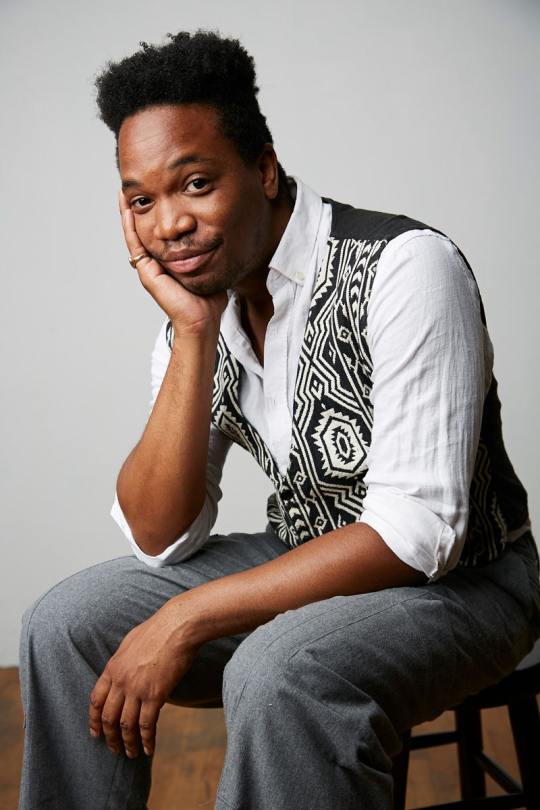
Keelay Gipson, an award-winning multi-disciplinary Afro-surrealist dramatist, activist, and teaching artist, knows what it means to battle your inner demons and come out the other side.
In June 2020, during the pandemic, Gipson’s mother, Gwendolyn, passed away. From the pangs of grief, Gipson began excavating and examining his life and journey as a storyteller. Born in Oklahoma City to a young, unwed mother, the prolific writer was adopted by a Black married couple from the Deep South who relocated and raised him in the idyllic suburbs of Tulsa. It was his mother that nourished his love of theater and the performing arts. Studying acting at Pace, and after a period of being relegated to roles of drug dealers, gang bangers, and sex workers, Gipson turned his focus to writing for the stage and advocating for Black people and Black lives through his work. This would eventually lead to a passionate drive as an activist, with Gipson eventually becoming a member of “We See You, White American Theater,” an anonymously-led coalition of artists that circulated a widely read set of demands for change during a cultural reckoning that saw seismic shifts in and out of the entertainment world.
Now, the award-winning scribe is on the verge of making his off-Broadway debut with the kitchen-sink drama demons., a poetic meditation on loss and legacy. The play, produced by The Bushwick Starr in association with JAG Productions, revolves around the Daimon family who have come together to bury their patriarch and exorcise the trauma passed down to them—but is it too late?
While speaking via FaceTime from his apartment in Brooklyn’s Flatbush neighborhood, Gipson was in the midst of rehearsals for DOT DOT DOT, a TheaterworksUSA musical commission based on the Creatrilogy trio of picture books by New York Times bestselling author Peter H. Reynolds, adapted with composer Sam Salmond. Below is our conversation about the glass ceiling, gatekeeping, and demons.
Marcus Scott (Rail): Can you describe the journey of going from actor to playwright?
Keelay Gipson: The journey from actor to playwright was really just me following the path of least resistance. I was a student in the Musical Theater program at Pace University (class of 2010) and didn’t find much success in booking roles in my time there. This was way before we were having these kinds of nuanced conversations surrounding race and representation in theater. So I began writing roles for myself to act. I would get folks together in an empty studio and we’d read my plays. Soon I stopped acting in them and would just listen to them. I found my voice while trying to give me and the other brown and Black folks an opportunity to be full artists during a time and in a program where that wasn’t happening.
Rail: How many plays have you written and where does demons. stand among them?
Gipson: I’ve written seven full length plays. demons. is the most recent. I began working on it in the summer of 2019 as part of a joint residency with New York Stage and Film and the Dramatist Guild Foundation.
Rail: While I have my theories—why is the name of your show called demons.?
Gipson: I grew up in a Southern Baptist household. The idea of demons. is something that has always been a part of my consciousness. As a child, I remember my dad telling stories about seeing exorcisms, and it always fascinated me. This idea that something other could be the cause of our afflictions, both mentally and physically. I wanted to toy with that idea. Honor the faith that I grew up with while reclaiming it on some level.
Rail: In a 2020 interview with JAGFest, you said “demons. was a play I wasn’t supposed to write, so I listened to the muse; I sat down and it came out of me.” Can you explain this?
Gipson: As I said, I was in residence with NYSAF and DGF at Vassar in the summer of 2019. I was there to work on another play of mine, The Red and the Black—which is a play about the rise of New Black Conservatism. I often have multiple projects going at one time. A play I’m “supposed to” be writing and a “procrastination play” [laughs]. demons. was the latter. Honestly, it was a thought experiment. I was moving squarely into my mid-thirties and I had seen friends lose parents, and I was trying to mentally prepare myself for what that might feel like. Little did I know, the play would be the precursor for my own experience with the death of a parent during the pandemic. I say, “it wasn’t the play I was supposed to write” but it was the play I needed to write.
Rail: So, what’s it about? What was the inspiration for your play demons.? I assume the loss of your mother.
Gipson: Yeah. So, the story follows a Black family after the death of their patriarch. And what I noticed in dealing with the aftermath of a death is that a lot of stuff comes up, right? So, demons. is an exploration through an Afro-surrealist lens of what comes up after the death of a family member, mainly of a parent. The things that you have to reckon with, things that maybe aren’t yours, but that you inherit. So, there’s this idea of inherited trauma, and especially with Black folks in America, what we pass down to our family members and what we leave behind when we’re no longer here. So, demons. is an exploration of all of those good things that death sort of unearths.
Rail: I followed your journey throughout the pandemic with regards to the loss. Once again, I'm very sorry for your loss, man.
Gipson: Thank you. I appreciate it.
Rail: What was your relation like to your mother?
Gipson: My mother was my biggest cheerleader. In high school, she was the president of the parent association for the drama program. She got the pass to come do a photo-call during the dress rehearsal; she would be there with her camera in the front row taking pictures, not for promotional use but for the scrapbook. Like, my mom was the one who was like, “Go to New York.” I went to New York a couple times in high school with my drama program and my mom came as a chaperone. We went and saw the shows that we saw with the theater department and then we went and saw our own shows. My mom, she loved theater and she was the one that—when we didn’t have the money and I didn’t know if I could come to New York to go to school—she pulled me aside and was like, “I’m gonna make this happen for you.” She was… she was everything.
Rail: So, you’re working on this play about Black conservatives—I think it’s hilarious cause both of us have written about Black conservatives during the pandemic, by the way—and you’ve got so many other things going on; you’re an advocate, or an “artivist” as you call yourself, being one of the figureheads behind We See You, White American Theater and the issues revolving around that, in tandem with the multiple projects you’re cultivating. So before we get into that aspect of your life, was it hard for you to kind of mentally go from one place to another place? Are you one of those writers where you have to be working on multiple projects or are you one of those writers where you can only work on one project at a time?
Gipson: I have never worked on just one project at a time. I think for me, I need something that’s completely opposite of the thing that I’m supposed to be doing. Like, if I have a commission that’s about a historical moment, then I’m gonna write something that’s wild and fanciful over here to like, break out of that—not monotony—but break out of the sort of structure that one wouldn't give me. So yeah, I’m often working on multiple things just to keep my brain limber.
Rail: That’s interesting. I see the link between The Red and the Black in your artivism, but what about this particular play with regards to it?
Gipson: This play kind of feels like a new era of my artistry. You know, I’ve written several plays that are about race, that are about Black folks dealing with race and racism, and not like, being beat down by it, but finding a way through; and I try to be honest in all of those works, but this play feels very much not a part of that pantheon. It feels like, to quote Toni Morrison, I’m taking the white person off of my shoulder. It’s not about race. It’s about Black folks. I wanna write about Blackness and all its complexity and not in relationship to whiteness or to racism. This feels like a new era of work for me, where it’s just about these Black folks in a room trying to figure out how they move forward after this thing devastates them. In the opening of the play, it says “a Black family and extremists.” Like, that’s what the play’s about. How do we relate to each other? The world sort of doesn’t come inside of the space in this play. It’s about Black folks in a space together figuring it out and not in relationship to society or the political landscape or 2022, 2023… it’s timeless in a way because death will always be true.
Rail: Let’s talk politics. Let’s get into it. There were many incidents over the last three years and many of those incidents in the industry in some way involved We See You, White American Theater. This collective has attracted the likes of Tony Award winners, the Academy Award winners, the Broadway Elite and those on the rise… What was the intention behind that? Was there a litmus for that?
Gipson: I think that during the pandemic, we had a lot of time, right? I’ll say that a lot of people had things in the pipeline and the industry was chugging along. There was no reason for it to change. It was working. Then everything stopped and we had time to look at the way that things are going. Look at our industry for real, holistically, and I think a lot of us brown and Black folks saw that it's not working, not for us, and it hasn't been for a long time. We’ve been tokenized. So, in working alongside those organizations and those movements, I was trying to galvanize other brown and Black folks who felt similarly that the industry wasn’t working for us and we could do better. Like, especially in the theater.
The theater is different than film and television because it’s people in a room breathing the same air, there are people sharing space, right? And I’ve always wondered how we can do better at sharing spaces with one another; and I’m all about community. The theater for me has always been a community-driven space. So, I wanted this community to mean what it says! I do think that it's business as usual a little bit again, which is not concerning because I think that the theater is working the way that it was designed to work. Much like a lot of things in our society. Yes, we can push back on it, but if we don’t imagine new models—like completely new models—then the old models that we’re trying to reform are always going to try to revert back to the way they were working. Cause that’s how they were built to work. So, the momentum of some of these things, like We See You… there are several organizations, I don’t want to just point to that one… but I wonder what their role is now because things kind of feel like they’re back to normal. I mean, the seven Broadway shows that were Black-led that came right out of the pandemic, that’s a great thing. But they all closed pretty early. Even with Ain't No Mo… it’s not working. So what?
It’s not us, it’s not the Black creatives. Right? It's because we know these things that we’re trying to make it better and it’s not getting better. So, it feels like it’s the model. I don't know, I think we need to imagine bigger than we are even doing now. I think we need to think magically, we’re theatremakers, right? We deal in magical thinking. I think we need to do that more when it comes to the theater because right now we’re just trying to polish a turd a little bit, it feels like. [Laughs] Like, we know it doesn’t work. And we had all of this time to try to make it work and it’s still not working. I think of the Cleveland Play House incident that just happened. And I’m like, “How, after all of this time of listening and learning, did we come to this moment?” So, we have to think magically. We need to think bigger than I think we even know.
Rail: For our readers, what are some things that we need to really look at? You mentioned the seven shows that opened on Broadway in the fall of 2021: Pass Over by Antoinette Chinonye Nwandu, Lackawanna Blues by Ruben Santiago-Hudson, Chicken & Biscuits by Douglas Lyons, Thoughts of a Colored Man by Keenan Scott II, Trouble in Mind by Alice Childress, Clyde’s by Lynn Nottage, and Skeleton Crew by Dominique Morisseau. Since that time, shows like Jordan E. Cooper’s Ain’t No Mo’, the Broadway transfer of the Asian-led musical K-Pop, MJ: The Musical (also penned by Nottage) and Adrienne Kennedy’s Ohio State Murders opened and closed on Broadway. Not to mention, Michael R. Jackson’s A Strange Loop.
Gipson: And it won every single award it could possibly win; you know what I mean?
Rail: What are some things that we can look at in general for the field? Because this is a global issue affecting Black, Brown and BIPOC people on both sides of the pond. Using a bit of magical thinking, what are some concepts, machinations or ideas that could work?
Gipson: I think it starts with audience cultivation. Honestly. I think outreach is a huge thing that theaters don’t know how to do because they rely on their subscriber base. That's the truth. The subscriber base we know is mostly older white folks who have disposable income. Millennials don’t have disposable income. And like, I'm sorry, but to get a package at one of these off-Broadway theaters, or to go to a night at the theater and get a good seat, it’s expensive. Right? So there needs to be outreach to people who can't spend a hundred dollars or five hundred dollars or a thousand dollars on a package for a season. And we need to make it cool. Honestly, theater is not cool. It’s only cool when it’s like the hottest ticket in town, right? Right? We need to figure out a way to make theater accessible to people younger than the Boomers and to Millennials that don’t have disposable income. And it’s not gonna happen with one or two nights of Affinity Nights. It’s gonna happen by putting people on late night shows! I don't know. I’m not like a marketing person but to me, it feels like there’s a disconnect between what the theater is talking about. Because once people come see these plays and get talking, that’s where the change will happen. But you gotta get people into the theater and from what I’ve seen, it’s the same people. And yes, there’s Affinity Nights, and so you can go to a Black Theater Night or an LGBTQ Theater Night and see your community. But the truth of the matter is we’re either seeing it for the second time, or it’s because it's your community, you’re finally seeing those people, but they were gonna come to the show anyway.
Rail: Ain’t that the truth. So, you are trying to appeal to a particular audience. How would you market demons.?
Gipson: I don't know. That's interesting because I couldn’t go to churches, I don't think, and market this show in the same way that like Ain’t No Mo’ might be able to. I’m a professor, so I’m going to try and get young people to see this show. Young Black people because this show’s kind of weird. I like weird stuff. Weird Black shows can be successful too. Shows that are weird and Black… there's a place for them. A Strange Loop is weird to me. I’m like, that's cool. Passing Strange, things like that. How can we take Black surrealism, things that are a little left of center, but talk about being Black in a way that is just as valid as something that’s a little more straightforward.
Rail: You’ve grown exponentially as an artist, mostly because of just the nature of the beast. Where do you think the next stage of Keelay Gipson is going?
Gipson: I hope it is still in the theater. Actually, I know it is. I think I'm working on some musicals. I know I’m working on some musicals. I’m working on a new history play about Tulsa (because I’m from Tulsa and I haven’t written about being from Tulsa and being Black from Tulsa, and I think I should do that). So musicals, a play about Tulsa and hopefully, a film or a TV show.
Rail: And if you could bring any family member to see this show, who would you bring?
Gipson: I would bring my mother. Yeah, I would bring my mother. I kind of regret—I’ve told her to wait so many times to, you know, just wait until it’s the real thing. “Don’t come to the reading, just wait till it’s the real thing.” So, I would want her to see the real thing.
Rail: Pleasure to finally meet you, Keelay.
Gipson: No, this was lovely. Thank you. Thank you.
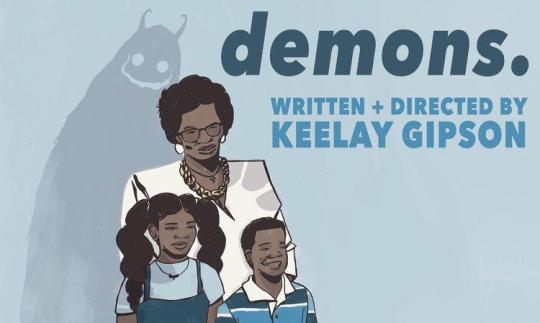
The Bushwick Starr and The Connolly Theater
demons.
May 20–June 10, 2023
Brooklyn
Contributor
Marcus Scott
Marcus Scott is a New York City-based playwright, musical writer, opera librettist, and journalist. He has contributed to Time Out New York, American Theatre Magazine, Architectural Digest, The Brooklyn Rail, Elle, Essence, Out, Uptown, Trace, Hello Beautiful, Madame Noire and Playbill, among other publications. Follow Marcus on Instagram.
#Keelay Gipson#KeelayGipson#Marcus Scott#MarcusScott#WriteMarcus#Write Marcus#Playwrights#Black Playwrights#Writers#Black Writers#The Brooklyn Rail#Brooklyn Rail
8 notes
·
View notes
Text
Finalists/Semifinalists Revealed For 46th Bay Area Playwrights Festival
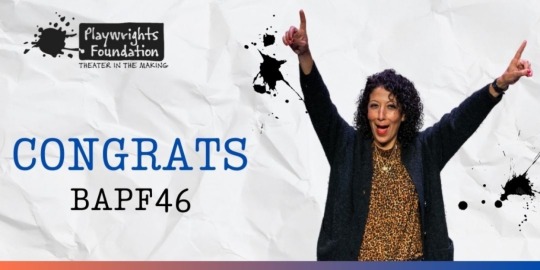
The festival received 614 applications from playwrights across the United States.
By: Chloe Rabinowitz
Jun. 01, 2023

Playwrights Foundation, the West Coast's premier launchpad for exceptional new plays and playwrights, has revealed the semifinalists and finalists for the 46th Bay Area Playwrights Festival, which will be presented in a hybrid festival (both in-person and streamed attendance options) April 12-21, 2024, per Playwrights Foundation's recent announcement to shift to a biennial festival structure. BAPF continues to uphold its legacy as one of the oldest and most successful new play festivals uplifting playwrights' new works early in their career.
The festival received 614 applications from playwrights across the United States. Applicants underwent a thorough evaluation process and were reviewed by Playwrights Foundation staff in collaboration with 189 committee readers-local and national theatre professionals serving as evaluators, with 57% who identify as playwrights. From this pool of 614 applicants, 148 semifinalists were carefully chosen based on the writer's voice, skills, and the play's potential. Applicants were narrowed down further to 45 finalists encompassing unique voices, under-represented narratives, and bold theatrical forms across various levels of experiences. Ultimately, five playwrights will be selected among the finalists and announced at a later point.
"The current landscape of contemporary playwriting is so vibrant. There is an abundance of writing which blooms with strong points of view, memorable plots and characters, and risk-taking moments of stagecraft." says Literary Manager Heather Helinsky. "Our community of readers were highly engaged by a wide range of theatrically innovative styles, compelling narratives, and poignant issues and themes. The semifinalists and finalists are deserving of reaching audiences in need of catharsis-from communal grieving to a good laugh."
Bay Area Playwrights Festival is one of the oldest and most successful new play festivals for new works in their early stages. Established in 1976 by acclaimed director Robert Woodruff, the festival has built a respected reputation for uplifting original and distinctive new voices in the theater, investing in the development of their work, and launching storied careers. Among the first writers developed at the inaugural BAPF was the young Sam Shepard. Since then, more than 500 prize-winning, nationally significant playwrights have received one of their first professional experiences at the BAPF, including Pulitzer Prize winners Nilo Cruz, Jackie Sibblies Drury, Paula Vogel, and Annie Baker; and acclaimed playwrights Lauren Gunderson, Rajiv Joseph, Katori Hall, Christopher Chen, Lauren Yee, and Marcus Gardley. BAPF's ongoing success in supporting and amplifying exceptional, newly emerging writers and launching their ground-breaking new work is its enduring legacy.
"We are excited to spotlight these talented playwrights and incredible plays in this year's BAPF semifinalists and finalists," says Executive Artistic Director Jessica Bird Beza. "There are an abundance of powerful narratives included on the list that made for an incredibly difficult selection process. We want to uplift and advocate for the dynamic work of this next generation of playwrights to other theatermakers and hope to see them on stages around the country."
After listening closely to playwrights and other constituents, Playwrights Foundation recently announced that the Bay Area Playwrights Festival model will shift from an annual festival to a biennial hybrid festival in order to expand the pre-festival program from 4 to 12 months. This change will allow staff to be more intentional and responsive to each playwright's needs and increase the amount of time, care, and resources dedicated to each playwright.
"The past few years have been a time for reflection and growth at Playwrights Foundation, resulting in newly expressed purpose, vision, and values," said Beza. "We move forward with a deeper commitment to center and empower the playwrights we serve, guided by a strategic plan co-created with significant playwright representation, and the 46th Bay Area Playwrights Festival program model changes reflect this."
45 FINALISTS FOR THE 46th BAY AREA PLAYWRIGHTS FESTIVAL
Calley N. Anderson, The Alligator
Jennifer Barclay, Behave Yourself
Nikki Brake-Sillá, ReWombed
Karen Marguerite Caronna, Dream of a Marginal Deity
Sam Chanse, Fellowship
Sean-Joseph Choo, otou-san
Avery Deutsch, The Last Beach Day
NJ Draine, The Housing Situation on Neptune
Lisa Sanaye Dring, Seven Hoshi
Jahna Ferron-Smith, Are We There Yet?
Noa Gardner, Nan
Sara Guerrero, Have to Believe We Are Magic
Mya Ison, Laure
Hasti Jafari, Superposition: A Crawling Play in Two Parts
Alicia Kester, Water Spirits
Garrett David Kim, Belligerency
Claire Koenig, DYKER BYKES
Molly Olis Krost, Nanay
Melissa Leilani Larson, A Form of Flattery
Minna Lee, My Home on the Moon
Jeffrey Lo, Balikbayan Box
Ethan Luk, Flight of a Legless Bird
Zizi Majid, They Came in the Night
Nick Malakhow, Optional Boss Battle
Divya Mangwani, Vigil-Auntys
Schaeffer Nelson, Hottest Church Dads
Miles Orduña, Lola
Rena Patel, Pyar aur Coffee
a.k. payne, Dwellers
Aidaa Peerzada, Children of the Wise
Phanésia Pharel, R&B
Eliana Pipes, Cowboy and the Moon
Christina Pumariega, Her Math Play
Ankita Raturi, Fifty Boxes of Earth
Aurora Real de Asua, The Pride Before
Harrison David Rivers, maybe the saddest thing
Nia Akilah Robinson, The Great Privation: How to flip ten cents into a dollar.
TyLie Shider, Whittier
DeAndre Short, At Ease
Phillip Christian Smith, Riverside Drive
Caridad Svich, Chelsea & Ivanka
Jason Tseng, Fear & Wonder
Emma Watkins, Elizabeth is Going into the Ground
Madison Wetzell, The Body Play
David Zheng, Ching Chong Maka Haya
103 SEMIFINALISTS FOR THE 46TH BAY AREA PLAYWRIGHTS FESTIVAL
Ai Aida, The True Tale of Princess Kaguya
Boni B. Alvarez, Sticky Rice
Amanda L. Andrei, Lena Passes By
Brent Askari, The Refugees
Alayna Jacqueline, You Know I'd Never (Even If I Did)
Jen Browne, Standing in the River While the World Falls Down
Phillip Gregory Burke, The Suncatchers of Sahel: An Ancestral Tale Told To Today's Griot, Part II: The Two Twilights
B.J. Burton, Maddie on Her Way Home
Nora Sørena Casey, The Censorship of Dreams
Chima Chikazunga, 1 Letter Shy of Coincidence
Matthew Chong, Lessons
Xavier Clark, backstroke boys
Katie Coleman, The Madonna of Logan Square
Lynne Conner, The Mother
Samantha Cooper, She Lives with a Shrine
Kate Danley, Working for Crumbs
Angela J. Davis, Griswold
Maddie Dennis-Yates, We're Just Redoing The Kitchen
Nelson Diaz-Marcano, 1898 or How Sugar Conquered the Enchantment
Judy M. Dove, Shinsei (rebirth)
Sean Dunnington, The Children's Farm
Alisha Espinosa, The Dirt is Fertile
Helen Everbach, Tea Patches
Zachariah Ezer, The Stones of Life
Jeanette Farr, Hedda on Fire: A Play Inspired by Ibsen and Climate Grief
Gina Femia, the thing about air
Lisa Dellagiarino Feriend, Come Again
Elizabeth Flanagan, Meth
Jeremy Gable, Carpenter Gorge
Craig Garcia, The Here and Now
Taylor Dodd Geu, Passing Over
Ruth Geye, These and Those
Emma Gibson, Lumin
Maximillian Gill, Blank Slate
Mikki Gillette, American Girl
lily gonzales, my eyes are up here honey
Franky D. Gonzalez, Escobar's Hippo
Ahon Gooptu, Seasons of Love
Keiko Green, Hells Canyon
Malique Guinn, Bounty on Our Heads
Katherine Gwynn, All I Want to Do is Be Pretty Like You
Rach Harris, Trophically Cascaded
Andrea Hart, Mounds or Talking Shit about a Pretty Sunset
Alli Hartley-Kong, People Should Talk About What's Real
Steven Hayet, Hugo Saves Christmas...in May!
Howard Ho, Reset
Daniel Holzman, Me & Who
Poliento Ico, A Love Letter to Loss
J. Lynn Jackson, Lucía Fuentes
Keenya J. Jackson, The Return of the Shogun
KJ Jarboe, Soured Milk
Jen Jarnagin, demolition extreme
Jacob Juntunen, See You in a Minute
Lisa Y. Kang, American Migration
M.J. Kang, The Battle of Saratoga
Ambata Kazi-Nance, M Power: A (Re)Birth Story
Lisa Kenner Grissom, here comes the night
Alex Lead, Easter Eggs for a Statistic
Tracey Conyer Lee, The First Time
Matthew Libby, Sisters
Alex Lin, Bad Chinese Daughter
Alicia Louzoun-Heisler, Bashert
John Mabey, Desert Oceans
Gloria Majule, Uncut
Eric Marlin, AirSpace
Leigh M. Marshall, The Hunters & All the Haunted
C. Meaker, Ghosts in the Graveyard
Francisco Mendoza, Piggyback
Alison Minami, Sinkhole
LJ Morizono, Transcending the Belly of the Beast
Aya Sophie Nassif, Without Her
Asia Nichols, The Incredible Darling(s)
Cynthia Galaz Ochoa, Matriarch
Dave Osmundsen, More of a Heart
Novid Parsi, Remains and Returns
José Pérez IV, Very Berry Dead
Reynaldo Piniella, Son of an Unknown Father
Zahida Rahemtulla, The Frontliners
Andrew Rincón, El Mito or The Myth of my Pain
Colette Robert, [landscape play]
Jacob K. Robinson, The Lark Ascending
Kira Rockwell, Space Bound
Ashley Lauren Rogers, Don't Think About Elephants
Lisa Marie Rollins, Token
Madeline Rouverol, You're Not a Mystery to Me
Martine Sainvil, Indispensable
Marcus Scott, There Goes the Neighborhood
Mak Shealy, exceptional
Nic A. Sommerfeld, Pieces
travis tate, YOUR MAXIMUM POTENTIAL
Sebastian Timpe, The House of Mulberry Street
Amy Tofte, The Rest of Us
Jackson Tucker-Meyer, The Perfection of the Donut
Josiah Thomas Turner, BECOMING!!, or, The Making of the Musical Sensation of 2279 and All that Followed
James Anthony Tyler, Pranayama
Joseph D. Valdez, Warrior's Blood
Hope Villanueva, Brackish
Caity-Shea Violette, Rx Machina
Stephanie Kyung Sun Walters, Come to Me, Cling to You
LaDarrion Williams, Hurt People
Lauren Wimmer, The Cookie Institute
Susan Yassky, The Women's Center
Laura Zlatos, Show Trial
ABOUT PLAYWRIGHTS FOUNDATION
Playwrights Foundation, led by Executive Artistic Director Jessica Bird Beza, was founded in 1978 and is widely recognized as one of the top playwright service organizations and new play incubators in the U.S., dedicated to supporting and championing playwrights' artistic growth and careers while uplifting their voices on a national level. PF envisions a future where playwrights are radically centered as visionary leaders who transform the world through storytelling. Serving emerging and mid-career playwrights from the Bay Area and around the country, PF has identified over 500 exceptional writers early in their careers and given them space, time and professional artistic collaborators to explore new theatrical ideas free from the pressures of the marketplace for more than 45 years. Playwrights PF has worked with have won every award in the theater including the Pulitzer, the Tony, the Obie, the National Critics Circle Award, the Susan Smith Blackburn Award, and many more. On its 40th Anniversary, Playwrights Foundation was recognized with a Theatre Bay Area Legacy Award for its substantial impact on the field. PF has received two Glickman Awards for best new play to premiere in the Bay Area through its Producing Partnership Initiative. Among the many PF-developed works that have premiered across the country are Katori Hall's The Mountaintop, Rajiv Joseph's Bengal Tiger at the Baghdad Zoo, Jihae Park's Hannah and the Dread Gazebo, Lauren Gunderson's The Revolutionists, Lauren Yee's King of the Yees, Madhuri Shekar's House of Joy, Mike Lew's Teenage Dick, and Mona Mansour's We Swim, We Talk, We Go To War, and many more.
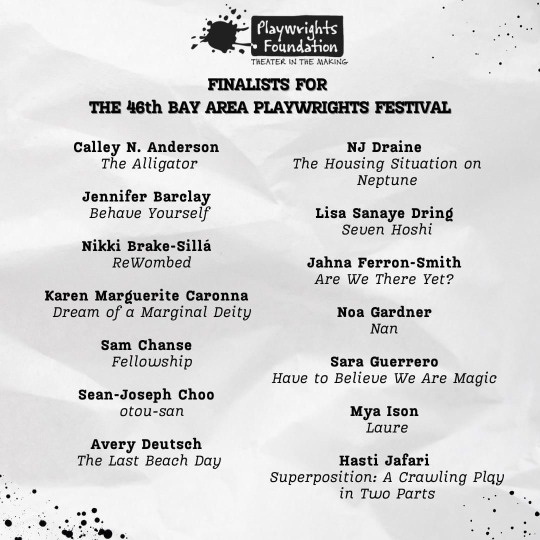
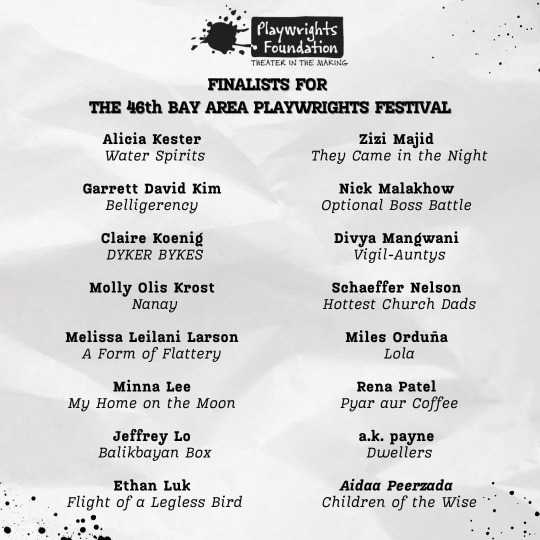
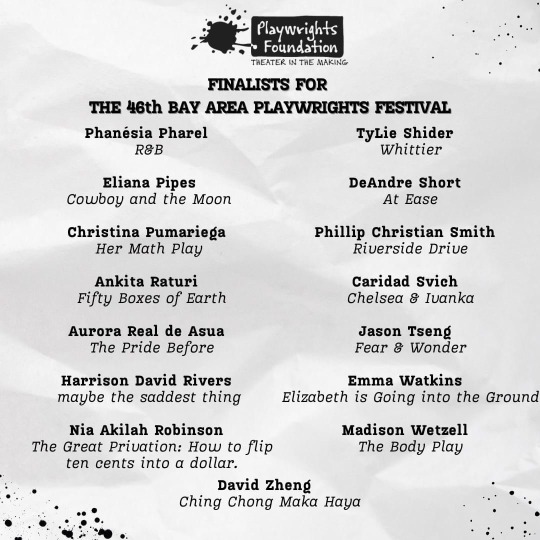
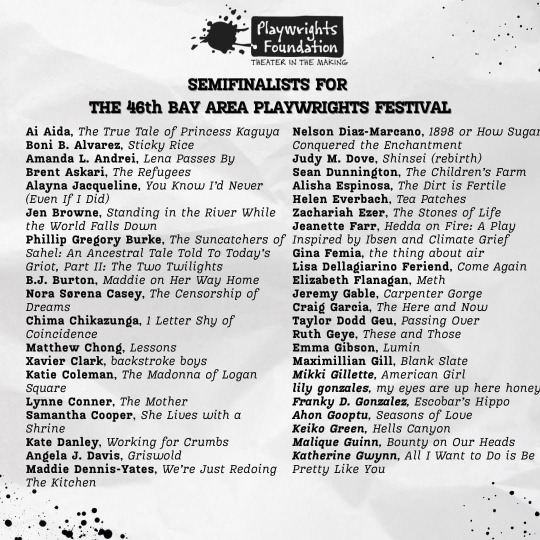
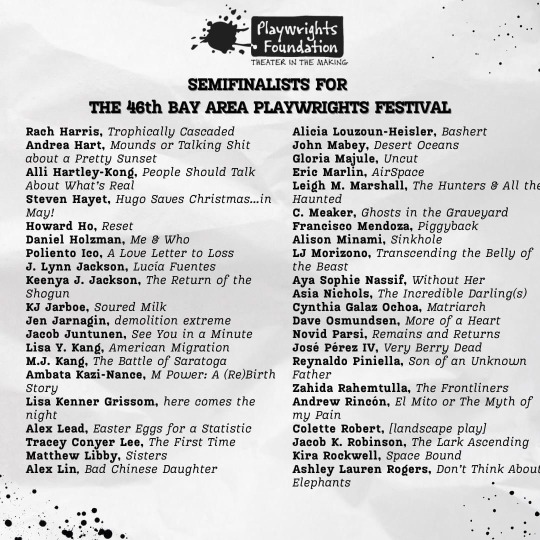
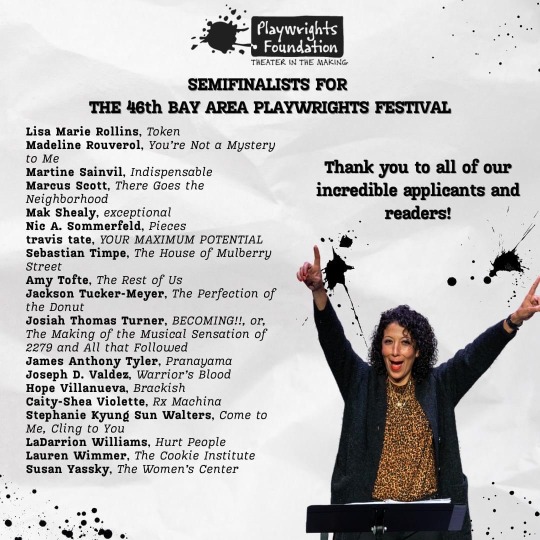
#Bay Area Playwrights Festival#BAPF#BAPF2023#BAPF46#Marcus Scott#MarcusScott#There Goes The Neighborhood#horror play#horror#theatre#theater#social thriller#semifinalist
2 notes
·
View notes
Text
Playwright James Ijames on 'Fat Ham,' the spotlight on Black queerness and life after a Pulitzer
A Q&A with the Pulitzer Prize–winning playwright of 'Fat Ham.'

Written by Marcus Scott
Wednesday February 8 2023
James Ijames won the 2022 Pulitzer Prize for Drama for Fat Ham, an irreverent riff on William Shakespeare’s Hamlet that feels like a call to arms for Black joy and queer representation. A jambalaya of satire, magical realism and the American domestic sitcom, the play follows Juicy (Marcel Spears), a morose online-college student, as he tries to come to terms with the marriage of his newly-widowed mother, Tedra (Nikki Crawford), to his Machiavellian uncle Rev (Billy Eugene Jones). “This ain’t Shakespeare,” Ijames noted in the show’s program. “Don’t get me wrong. I love Shakespeare, this just ain’t him. This ain’t a tragedy…This play is offering tenderness next to softness as a practice of living. This play is celebrating Blackness that is traditional and weird and lonely and happy and grieving and honest and frightened and brave and sexy and churchified and liberated and poetic.”
Fat Ham had its world premiere in the spring of 2021 in a digital production by Philadelphia’s Wilma Theater. A year later, it made its onstage debut at the Public Theater, directed by Saheem Ali, and became one of the buzziest plays of the season. On March 21, 2023, that production will begin a limited run at Broadway’s American Airlines Theatre. We chatted over FaceTime with the playwright as he prepared to step into rehearsals.
Fat Ham moves Hamlet from a medieval Danish castle to a modern-day cookout in North Carolina. Why a barbecue?
“Barbecues are cumulative spaces. It starts with a few people and then it grows. There’s food, and people are drinking. It’s a space of truth-telling, it’s a space of game-playing, it’s a space of intimacy and warmth—and it’s where secrets come out. My family recently came together for the Christmas holiday and a cousin of mine made an announcement about being pregnant. Everyone was just so excited and lifted by that; everyone’s energy turned towards them in this really beautiful way. I wanted a space where that sort of collective joy was possible and also where a big, messy argument was possible. Where a fight was possible, where drinking was possible, where eating was possible, where romance was possible. In Shakespearean comedies, when you go outside or into the woods—like the forest of Arden [in As You Like It] or the forest in Midsummer—it’s a space where anything’s possible. There’s magic. We’re not inside, in a cold room in a cold castle. We’re outside: We have decorations, we’re colorfully dressed. We are in the sort of space where magic is palpable and possible.”
Juicy is not your typical Hamlet. He is Black and Southern and, as you describe him in the play, “thicc.” What was the motivation behind that?
“Well, I’m Black and from the South, and that drove my desire to play with people that sound and look like me. When you see productions of Hamlet, he's usually white and sort of athletic. I wanted to make a version of this play that was open to a body type that wasn't that; I'm a person who, for pretty much my whole life, has had some struggle with my weight and my perception of what I look like and how I feel in my body. And another thing I wanted to do was to explore Blackness in the South in a way that felt contemporary, that didn't feel held by history—looking at Southern communities right now as opposed to a nostalgic imagination of the Black South.”
Why did you choose for Juicy to have a passion to study Human Resources in college?
“Human Resources is about care and workflow. Efficiency. I wanted Juicy to have a passion for something that felt antithetical to his father. He wants to make sure people are okay.”
How does that contrast reflect other things about the way you have approached Shakespeare’s story?
“I think the play is exploring multiple modalities of masculinity. We see a lot of different kinds of Black masculinity on the stage. We see Juicy, we see Tio, we see Larry, we see Pap and Rev. And there’s a masculinity that’s implied about the community that they live in, that is sort of present in the room. I wanted to show that masculinity is not monolithic—it’s not as simple or cut-and-dried as it’s often depicted. I also wanted to explore cycles of trauma and violence in families. I’m interested in primordial stories, stories that no matter what culture you walk into, there’s like a version of them. I always think of Hamlet as—and I don't know that a lot of people think of it this way—but I think of Hamlet as a Cain and Abel story: the story of a sibling killing their sibling to get ahead. Anybody can relate to that; that’s a [narrative] that you inherit and moves with you through generations. And the younger folks in the play have to make some decisions about whether or not they want to continue that, whether that’s what they want their lives to look like and their relationships to each other to look like. I’m calling into question the stories that we’ve been passed down as wisdom. Because sometimes it’s wisdom, but more and more I look at those stories as cautionary tales of what you shouldn’t do. Vengeance isn’t gonna help Juicy. Killing his uncle is not gonna help Juicy’s life get any better.”
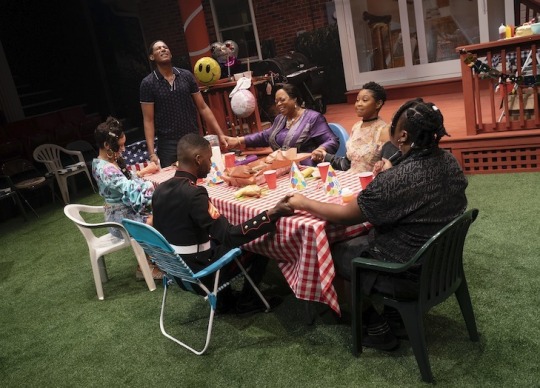
Your breakthrough play was Kill Move Paradise in 2017. How do you think you've changed as a writer since then?
“Oh, gosh. When I look at Kill Move Paradise, that play is quite erratic, you know [he laughs]. I always describe it as the way that I try to metabolize my anger and my fear and anxiety about being a Black body driving around in America, walking around in America, just trying to live my life. And so it has that anxiety in it. It has that fear and nervousness in it. It’s in the text, you can feel it on the page. As I've gotten a little older, I've experienced more and I've written more—the more you write, the better writer you become. I'm more intentional with story, with plot; how I'm weaving a theme or a theory into the action of a play is a bit more sophisticated than it was when I was starting out. The anger is usually shrouded in rebellion or exuberance. At a point in my life, anger sort of dragged me down into a space of high-blood-pressure fury. But I think now the work offers people an invitation to metabolize anger in a different way. By the time we get to the end of Fat Ham, people are dancing in the aisle.”
They certainly are.
“And that is not to negate the fact that we’ve just watched the thing that had pain in it, that had trauma in it, that had violence in it. But just because you’ve been through difficulty doesn’t consign you for the rest of your life to difficulty, to trauma, to pain. We have access to joy, we have access to resilience, we have access to exuberant ecstasy. Black history, in this country in particular, teaches us that: The blues and jazz and hip-hop come out of extraordinary awful scenarios and settings. Those art forms are undeniably both Black, but undeniably exuberant, resilient, unabashed, queer—all of those things! They possess all of those things. When I sit down to write a play, I know that at the end I have to send people out into the world, into the streets, into workplaces, into homes. My hope is that I’m leading them to some hope.”
This play is pretty fantastical, and there are various displays of spectacle and magic. There are also a panoply of images and homages to the Pan-African cultural experience—allusions to Louisiana Voodoo as well as Central African, Creole and Haitian Hoodoo symbology.
“Ghosts are a feature in a lot of my plays. Magic is a feature in a lot of my plays. Because I’m a person who grew up with people who kind of had magical ways of thinking. I grew up Baptist: hardcore, every Sunday, sang in the choir, youth ministry, youth usher—like, I am a church gay! I also grew up in a family that has New Year’s Eve traditions that they do, and will throw salt over their shoulder, or say “Don’t sweep over a single man’s shoe because he won’t get married.” That sort of Hoodoo connection to the spirit world and connection to ancestors was also a big part of the family that I grew up in. And so magic in that respect feels very real to me. Ancestors feel very present—the reverence for people who have passed on is immense. So, to me, the ghost of Juicy’s father showing up isn’t just a specter from this other world that is coming with caution and with information. Juicy is having a conversation with his ancestor and he talks to his ancestor, the way that I talk to mine. The thinness of that veil between here and there—I relish in that, and the theatrical allows you to do that with a lot of ease. I didn’t want the ghost to be a joke. He’s funny—that cat is extremely funny—but he also has these great moments of, like, “Wow, I really messed you up.”
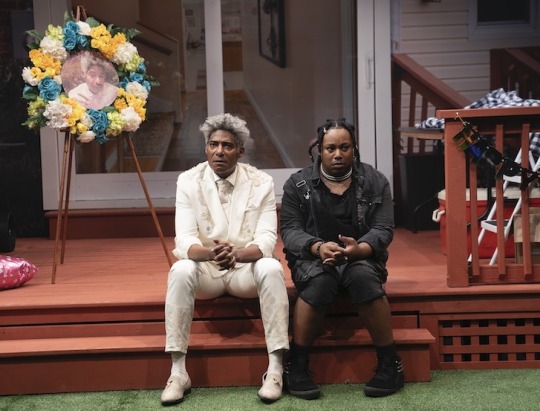
There is a long literary tradition of Black writers explaining Blackness to people who aren’t Black. You don’t do that here. In fact, this play comments on performing Blackness, trauma porn and “enterpainment” on stage—and it’s done with humor. Why was this important to you?
“Humor is powerful. It opens us up to hearing things in a new way. It’s a big part of all of my plays. The question about explaining Blackness is huge to me. I don’t feel like I have to explain Blackness to an audience. I’m assuming that everyone will catch up who doesn’t understand.”
At the end of the show, there’s a cover of the funky dance-pop disco tune “Kill The Lights” sung by Broadway actor Mykal Kilgore. What inspired that particular needle drop?
“I love disco music, just personally. Anybody can dance to it. If you are off-rhythm, you will be on a rhythm with disco music because it’s four-on-the-floor and is just all-encompassing. It strives for ecstasy, it strives for moving from a passage from one state to another. Probably because they were all like using drugs and having sex while they were listening to it in the Seventies and Eighties. But this is a contemporary artist singing in the disco style. It’s not a song from the era. It just moves people! That music moves people.”
If you were to classify your previous plays by genre, with Fat Ham being disco, what would your other shows be?
“Ooh.” [He laughs.] “I think Kill Move Paradise, if I had to put a genre to it, it’s Southern hip-hop, right? It’s sort of grounded in that culture. I would say White is like pop music—it’s like my Ariana Grande album. And Miz Martha is Americana music. It’s like bluegrass with a trap beat.”
Only nine writers of Black descent have been awarded the Pulitzer Prize for Drama in its 105-year history: Charles Gordone for No Place to Be Somebody, Charles Fuller for A Soldier’s Play, August Wilson for Fences and The Piano Lesson, Suzan-Lori Parks for Topdog/Underdog, Lynn Nottage for Ruined and Sweat, and the last four prizes in a row—Jackie Sibblies Drury for Fairview in 2019, Michael R. Jackson for A Strange Loop in 2020, Katori Hall for The Hot Wing King in 2021 and now you. Is something going on in the zeitgeist? Is there something special about Black writers that make their work more urgent right now?
“I think a few things are happening. Black writers and Black directors have been trying to push the form in new directions, to be both in conversation with the cannon and also pushing against the cannon. Those four plays—starting with Fairview and going to A Strange Loop, The Hot Wing King and Fat Ham—all four of those plays are actively doing those things. And so are some plays that haven’t won Pulitzers but have been defining culturally, like Slave Play and things like KPOP. The audience for that work is already there and primed, and it’s just waiting for someone to make art for them, you know what I'm saying? People are curious about what is possible in the form. I remember seeing Fairview and just being blown away by the audacity of it. It made me want to be more ambitious—to create more of a social experiment with my work in collaboration with an audience. I think the same thing is true of A Strange Loop and Hot Wing King in terms of those plays’ exploration of Black queer identity. And that flows rather beautifully into Fat Ham, which is doing the same sort of thing by taking a play that people cherish like Hamlet and saying, ’Not only is this mine, it’s mine in these particular ways, and this is what I’m gonna keep and this is what I’m gonna discard.’ So some of it is just us, as writers, wanting the form to feel as vital and as urgent as possible. And one way to do that is to examine how we write things and try to find new ways into storytelling.”
Those last three plays in particular have centered on Black queerness, and on what we might call radical softness. Is there something in the ether? Was there something in the culture that made us say, “Now that’s something we need to address, to attack, to appraise?” Because it all kind of happened around the same time.
“Hmm. I don’t know. That stretch of plays spanned the heartiest points of the pandemic, and we were all quite hungry for connection, closeness, touch, tenderness. And that offered an opportunity for people to be excited about seeing something that felt soft or vulnerable. I think people respond to that because we want to be better. Culturally, I think, we want to try to do things differently. It remains to be seen whether or not that will continue, but people wanted to engage with things that felt tender, that felt connective, and all of those plays are great examples of that. And I think that’s also true of Fairview; with the separation that it is asking for, it’s asking for people to sit in an embodied space with an idea.”
Last question: How has your life changed post-Pulitzer? Has that changed how people think of you and your work? Or how you think of yourself and your work?
“Oh my gosh! It’s just made my life so much busier, but it’s also made me focus on the work. Refocus on my craft and my practice. I don’t want this prize to freeze me in time. I want to keep pushing and keep expanding what I do.”
Fat Ham begins previews at the American Airlines Theatre on March 21, 2023, and opens on April 12. Tickets are available here. This interview has been condensed and edited for clarity.
Follow Marcus Scott on Instagram:@therealmarcusscott
Marcus Scott

#Marcus Scott#MarcusScott#WriteMarcus#Write Marcus#playwriting#playwrights#playwright#James Ijames#JamesIjames#Fat Ham#FatHam#Broadway#The Public Theater#Public Theater#Time Out#TIme Out New York#TimeOutNewYork#TimeOutNY#Time Out NY
6 notes
·
View notes
Text
‘A Strange Loop’ Takes a Victory Lap That Was Years in the Making
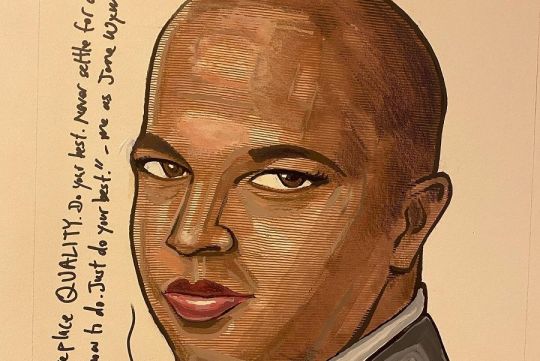
When he put ‘Broadway’ in a song lyric, Michael R. Jackson was unwittingly naming the destination, and the destiny, for his unapologetically Black and queer musical, which won the Best Musical Tony last night.
BY MARCUS SCOTT
On a cloudy Wednesday morning, less than a week before he was to make his overdue, pandemic-postponed Broadway debut, musical theatre writer Michael R. Jackson was scrambling. His idiosyncratic, existential, metafictional musical A Strange Loop was days away from opening, after the creative team had been forced to cancel a first preview performance when COVID-19 cases were discovered within the company. That meant less time for Jackson to finesse scenes and songs, causing a burst of small panic behind the scenes. Originally scheduled to start previews on April 6, the production launched instead on April 12, just in time for the show’s understudies to spring into action and for Jackson to make revisions. It opened just two weeks later, on April 26, becoming a bona fide critical smash, with Jackson being celebrated for the musical’s craftsmanship, fearlessness, and unbridled humanity. Sales have been strong, and last night’s Tony wins—for Jackson as the show’s book writer, and A Strange Loop as best musical—are sure to bolster the show’s fortunes.
That Wednesday before opening, Jackson was thinking back to the beginning of rehearsals.
“It was a really exciting and emotional day,” Jackson, 41, recalled from the Washington Heights apartment he’s lived in for 15 years. “I told the room that day that it was really amazing that this thing I wrote alone in a room up the stairs of this little old lady in a bungalow house in the middle of nowhere in Jamaica, Queens—that I wrote this monologue as a little life raft for myself on my little Compaq Presario laptop—somehow, over the years, blossomed into this mighty ship that landed on Broadway.”
The seeds for that ending were planted, he thinks, when he added the lyric to the opening number calling what we were about see a “Big, Black, and queer-ass American Broadway show.” He confessed, “Even when I wrote that, I didn’t think the show was going to Broadway, and that wasn’t even what I was trying to do. I was trying to make what felt like a Broadway show to me—my version of what that was supposed to be. So it’s just wild, all that manifesting and that sort of artistic rigor ended up resulting in the show going to Broadway. It feels like a miracle or magical, or something otherworldly, that that could happen.”
A Strange Loop follows Usher (played Jaquel Spivey in his first professional gig out of college), a 25-going-on-26-year-old “overweight-to-obese” Black queer musical theatre writer making a musical about a 25-going-on-26-year-old “overweight-to-obese” Black queer musical theatre writer, ad infinitum. The character’s name is both a reference to the blockbuster-selling R&B singer-songwriter and to the day job the character holds at The Lion King on Broadway, counting down intermissions while assisting entitled wealthy patrons to their seats and dreaming up his breakthrough show; we spend the majority of the show in his mind. Accompanying Usher is a Greek chorus of six “Thoughts,” played to perfection by the spectacular sextet of L Morgan Lee, James Jackson Jr., John-Michael Lyles, John-Andrew Morrison, Jason Veasey, and Antwayn Hopper, each of them contrasting, conspiring against, or calling him out at every turn.
The origins of Jackson’s crowning achievement have become somewhat mythic: Shortly after graduating from New York University’s Dramatic Writing Program in 2002, a 21-year-old Jackson wrote a thinly veiled monologue, a coping mechanism for his career anxiety as a fresh-out-of-college playwright called “Why I Can’t Get Work,” that became the kernel for the show. That monologue was about a young Black gay man walking around New York assessing his life, his career trajectory, and his worth as a Black gay man who is “too fat,” “too femme,” and “too Black” for the culture.
Two years later, while Jackson was attending NYU’s Graduate Musical Theatre Writing Program, a peer of his, Darius Marcel Smith, performed an original song about a one-night stand with another man, and the guilt and shame that came along with being a God-fearing Christian. Inspired, Jackson jotted a lyric in his notebook: “All those Black gay boys I knew who chose to go on back to the Lord.” This phrase, and a musical motif from Tori Amos’s “Pretty Good Year” (the third single from her sophomore effort Under the Pink) inspires him to pen “Memory Song,” snapshots from his coming of age in Detroit as a gay boy with a religious and homophobic upbringing; it would be the first song he’d write as composer and lyricist, and the first germ of what would one day be A Strange Loop. The monologue soon grew into a solo show titled Fast Food Town, performed to mixed reviews Off-Broadway at Ars Nova.
Originally titled “Gayville”—a riff on Exile in Guyville, Liz Phair’s seminal 1993 bedroom-pop indie-rock debut, itself a response to the 1972 Rolling Stones’ cock-rock album Exile on Main Street—Jackson’s musical followed an ultra-self-aware, disillusioned, and furious 20-something undergoing a quarter-life crisis and the downward spirals that come with wading through a liminal space of being a postgraduate, pre-career artist trying to find their corner of the sky. While Phair’s influence looms over the project (check out “Inner White Girl”), her inclusion was a bit more deliberate at first.
“There was an old, old, old draft of A Strange Loop wherein Usher, the character in the musical, was writing these mashups of his songs to Liz Phair songs, mostly to her Exile in Guyville album, and there was a narrative also within the piece where he was trying to reach out to her and get her permission to use her music in the show but also talking to her through his own music mashed up with hers,” Jackson explained. “In real life, I was trying to track her down and get the rights to use her music as well.”
Eventually Phair got back to Jackson, encouraging him to write his own material and make it personal. So he scrapped the mash-ups and began to purge, but thankfully he didn’t take himself too seriously. As a result, A Strange Loop is a disruption, an existential treatise on the soul as it wrestles with topics and taboos at the crossroads of the sacred and profane, all while eviscerating the musical theatre form. Yet its most alluring takeaways come from Jackson’s obsession with the self and with self-identity—an impulse that no doubt be traced to the singer-songwriters he adored growing up.
“There was a song I had written in the show that’s no longer in it called ‘Fan Boy’ that was a mashup against the Liz Phair song called ‘Strange Loop,’ and for years I never knew what the term ‘strange loop’ was—it was just a song on the album that I just really liked,” he clarified. One day it dawned on Jackson to type the phrase into Google, which led him to Douglas R. Hofstadter, the scholar of cognitive science and comparative literature. In his Pulitzer-winning 1979 book Gödel, Escher, Bach: An Eternal Golden Braid, Hofstadter coined the term “a strange loop” to describe the navel-gazing nature of individualism and intelligence, writing: “In the end, we are self-perceiving, self-inventing, locked-in mirages that are little miracles of self-reference.” The term, used to describe the paradox of one’s sense of self, is also mirrored in Jackson’s allusions to what W. E. B. DuBois called the “double-consciousness” of African American selfhood created by racism and anti-Blackness. Thus began a series of strange loops, with Liz Phair leading Jackson to Hofstadter, which in turn led him to the title and structure of his groundbreaking hit.
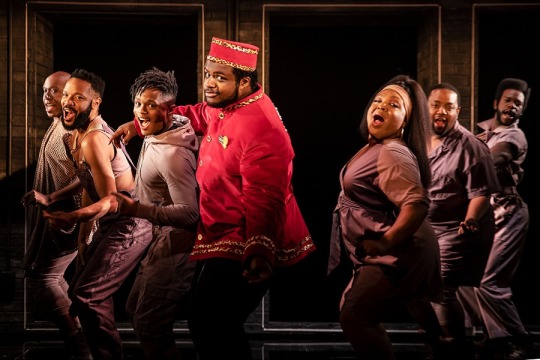
A Strange Loop is hardly the first metafictional musical. There was Jonathan Larson’s semi-autobiographical rock monologue-turned-musical, tick, tick . . . BOOM!, adapted by Lin-Manuel Miranda into a feature film last year. There’s also Jeff Bowen and Hunter Bell’s [title of show], a one-act musical about four characters creating the musical they’re simultaneously performing, which played at the Lyceum Theatre 14 years prior. Yet Jackson’s acclaimed pop-rock Bildungsroman actually follows a lineage of sui generis metafictional musical theatre writers of the post-Black Arts Movement tradition. Like Kirsten Childs’s The Bubbly Black Girl Sheds Her Chameleon Skin and Stew’s Passing Strange before it, A Strange Loop is a funny, life-affirming coming-of-age story about a young, gifted, and Black creative as they journey toward self-discovery and self-acceptance. Fusing gospel, jazz, punk, and blues with rock music, Passing Strange is a fourth wall-breaking picaresque odyssey of Black identity and code-switching against a backdrop of Berlin’s 1987 May Day riots. Through a mélange of ‘60s girl group pop, R&B, and showtunes, The Bubbly Black Girl Sheds Her Chameleon Skin explores a young woman’s battle with internalized racism and self-worth while surrounded by racial profiling, de facto segregation, and sexism in the wake of 16th Street Baptist Church bombing.
A Strange Loop continues the conversations that began with those genre-defying musicals, merging gospel, folk rock, bedroom pop, and alternative music while forging a new path for Black and queer storytelling in the age of Truvada. In American theatre, white gay men have co-opted and oversaturated the marketplace for LGBTQ narratives. Whether it’s the gay Civil Rights movement (Mart Crowley’s The Boys In The Band, Dustin Lance Black’s 8), or the HIV/AIDS epidemic (Larry Kramer’s The Normal Heart, Tony Kushner’s Angels in America: A Gay Fantasia on National Themes, Steven Dietz’s Lonely Planet, William Finn’s Falsettos), or collective trauma (Doug Wright’s I Am My Own Wife, Moisés Kaufman’s The Laramie Project, Martin Sherman’s Bent, Harvey Fierstein’s Torch Song Trilogy, and Douglas Carter Beane’s The Nance), or even queer joy (Fierstein’s La Cage aux Folles, Sherman’s The Boy From Oz). Naturally, a show centering a plus-sized, dark-skinned Black queer man with ambition stands in opposition by design. But A Strange Loop goes further than that, showing no qualms about interrogating such issues as the HIV stigmatization of the Black queer community, racial fetishization, internalized homophobia, parental blackmail, self-loathing, and the paradox, trauma, joy and vicissitudes of being Black and queer and religious.
Indeed, in its brisk 90 minutes, A Strangle Loop both deconstructs and glorifies Black art and queer iconography with absolute abandon. Bristling with references to The Golden Girls and Designing Women, advice columnist Dan Savage, and spoken word artist Audre Lorde, Stephen Sondheim and bell hooks, Scott Rudin and Betty Friedan, the show skews the lines between gay and straight, Black and white, high and low culture with aplomb, putting the musical-within-a-musical in a league of its own, while bridging divides very few of the aforementioned shows have.
No one is safe from critique. One of the biggest targets of Jackson’s ire is Tyler Perry, the multimillionaire movie media mogul, well known for his lowbrow, Chitlin’ Circuit-inspired entertainment, full of ham-fisted messages about the power of prayer. Hallmarks of Perry’s works are satirized and spoofed with surgical precision in A Strange Loop: The stalwart matriarch, the low-income black sheep with an addiction to crack cocaine, the “Strong Black Woman” meandering through life as a lonely spinster with an offstage Ken doll lover interest. Jackson’s contentious relationship with Perry began when a childhood friend introduced him to the impresario’s work shortly after he arrived in New York in 1999; as a gag gift for her birthday, he purchased tickets to see a staged production of Why Did I Get Married? at the Beacon Theatre, starring R&B vocalist Kelly Price, who wore a fat suit in the first act. In A Strange Loop, Usher calls Perry out for his “simple-minded hack buffoonery,” but the mockery is tinged with anxiety; we get the sense that Usher might genuinely be afraid he will create such color-by-number material himself. With each gibe, Jackson holds up a mirror to both the protagonist and himself with profound hilarity and heartbreak.
In one of the show’s most subversive, farcical numbers, “Tyler Perry Writes Real Life,” Usher is confronted by his Thoughts as they masquerade as historical Black figures: Zora Neale Hurston, James Baldwin, Marcus Garvey, Harriet Tubman, and a proxy for every Oscar-bait antebellum picture simply given the name Twelve Years a Slave. Throughout the tune, the Thoughts chastise him for imagining that he is above Perry’s work, especially when an agent offers him an opportunity to quickly ghostwrite a gospel play—news that overjoys his devout parents but repulses Usher. While Usher’s critiques about Perry’s oeuvre have been echoed by his peers, it is his pointed criticism of the filmmaker’s stigmatization of Black queer sexuality and HIV that come into sharpest focus, especially where Perry’s “hate the sin, not the sinner” ethos is concerned. Toward the end of the show, Usher leads his Thoughts in a revival number titled “AIDS Is God’s Punishment,” ridiculing Perry’s proclivity to perpetuate stigma and condone the belief that people living with HIV are sinners who deserve punishment for loving and living out loud. It is a primal scream, Usher’s direct confrontation with the fear mongering and homophobic scripture preached down to him as a youth, as well as a moment of grief for a friend he lost to AIDS. Jackson doesn’t just critique Perry and the Black church here; he also zeroes in on the American theatre and its role in disregarding Black queer people and their stories in favor of white comfort.
“Being willing to challenge any assumptions or popular points of view, being able to question any orthodoxy or status quo—to me that goes in all directions,” Jackson said. “That means if Black Twitter is into something and I’m not into it, that means being willing to risk the ire of Black Twitter, that means being willing to risk the ire of the theatre world, that means being willing to risk the ire of liberal Democrats, of conservatives, of whomever—white people, Black people, everyone, treating everybody the same—and being willing to stand alone, if necessary, in your truth.”
A lot has changed for this musical theatre provocateur in recent years. A major career shift came when A Strange Loop was awarded the Pulitzer Prize for Drama in 2020, becoming only the 10th musical to earn the honor overall and the first to win the award without a Broadway run. Jackson, who was watching an episode of Bravo’s The Real Housewives of Atlanta while conversing with playwright Branden Jacobs-Jenkins when he received the news, not only made history as the first Black artist to win for writing a musical; he has also become part of a string of Black-authored Pulitzer winner, with Jackie Sibblies Drury’s divisive critical race experiment Fairview nabbing the award in 2019, and Katori Hall’s The Hot Wing King taking the award in 2021 and James Ijames’s Fat Ham winning it this year.
That win was part of the momentum building behind A Strange Loop, which had its Off-Broadway premiere at Playwrights Horizons in 2019, then a limited engagement at Washington, D.C.’s Woolly Mammoth Theatre Company last year. Joining a team led by producer Barbara Whitman and Page 73 Productions, the show’s current Broadway outing has attached an impressive Rolodex of stars to its co-producers’ roster, including RuPaul Charles, Don Cheadle, Jennifer Hudson, Mindy Kaling, Billy Porter, Ilana Glazer, Alan Cumming, Zach Stafford, Cody Renard Richard, Benj Pasek, and Justin Paul. It garnered a record 11 Tony nominations, and though it only took home two of those, they were ones that count: Best Book of Musical and Best Musical. (Best Original Score went to Six.) These wins cap a busy awards season that saw it take home Outstanding Production of a Musical at the 2022 Drama League Awards, and an Outstanding Actor in Musical Award for lead actor Jacques Spivey, who also got an Outer Critics Circle Award and a Theatre World Award honor. Meanwhile L Morgan Lee’s performance earned her the distinction of being the first openly transgender performer to originate a role in a Pulitzer-winning piece of theatre and the first to receive a Tony nomination. Jackson was also included in Time Magazine’s Time 100, an annual listicle of the most influential people in the world, where he was nominated by Porter.
Like many writers for the theatre, he has also become an in-demand writer for TV and film. He recently joined the creative team of the Amazon original series I’m a Virgo, a half-hour superhero satire from writer-director-producer Boots Riley (Sorry to Bother You), starring Jharrel Jerome. Jackson is also developing a TV series for ABC Signature and sold an original pitch to write an untitled horror feature for A24, which Ari Aster and Lars Knudsen are producing under their Square Peg banner. But not to worry, theatre fans, Jackson is still at work on various stage works: White Girl in Danger is a new pop-rock musical partly inspired by classic daytime soaps and ’90s-era Lifetime movies, in development with the Vineyard Theatre Off-Broadway and director Lileana Blain-Cruz; and Teeth, based on the 2007 indie vagina dentata horror comedy by Mitchell Lichtenstein, is being workshopped in collaboration with composer-lyricist Anna K. Jacobs. Jackson has also been commissioned by LCT3, Lincoln Center Theater’s program for emerging artists, to pen Accounts Payable, an original musical inspired by the days when he was slumming it as a finance clerk and executive assistant.
From those bleak early to his current success, Jackson’s North Star has been his dedication to his craft and to the truth.
“I do feel like I’ve changed in a lot of ways,” Jackson said of the past few years in the spotlight. “But I also feel like I am the same person I’ve always been, which is to say I’ve always been somebody who has been trying to get at the truth of life as I understand it and constantly try to scavenge and dig deeper and get past the surface level answers of questions I might be having or that confuse me. I feel like as a young person, a young writer, I was doing that from a much younger perspective.
“That has been the trail I tried to blaze: to be willing to have an unpopular opinion and have a nuanced opinion,” he continued. “That’s only gotten more important to me, especially over these last couple of years, as lots of cultural conversations have taken hold and really gotten louder. I have lot of criticisms and questions in places where I stand apart from my peers, and I have to be willing to stand in that place. I try to stand in that place respectfully and with compassion, even when I want to read people for fucking filth. Even when I have utter contempt for some people and ideas that I see being bandied around.”
As uncompromising as his show’s protagonist, Jackson stood in his truth, and, upon receiving his Tony Award for Best Book of a Musical to a standing ovation, encouraged the American theatre to opt for quality in art. This is a fulcrum moment not just for Jackson, but for every outcast and outlier building their life rafts on the island of misfit toys that is the theatre at its best. As a patron sings to Usher in “A Sympathetic Ear”: “If you’re not scared to write the truth, then it’s probably not worth writing / And if you’re not scared of living the truth, then it’s probably not worth living.”
Marcus Scott is a New York-based playwright, musical writer and journalist. He’s written for Architectural Digest, Time Out New York, The Brooklyn Rail, Elle, Essence, Out and Playbill, among other publications.
#Michael R Jackson#A Strange Loop#MichaelRJackson#AStrangeLoop#Marcus Scott#MarcusScott#WriteMarcus#Write Marcus#American Theatre Magazine#Black playwrights#Black Musical Theatre Writers#Black Musical Theater Writers
4 notes
·
View notes
Text
Gingold Theatrical Group to Present SPEAKERS' CORNER New Play Development Workshops
Featuring: Karma Sutra Chai Tea Latte, Vigil-Aunties, There Goes The Neighborhood, and Howl From Up High.
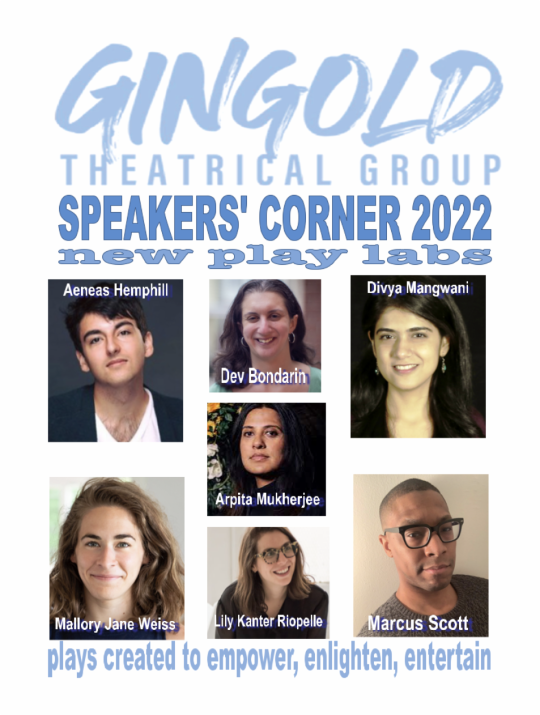
by Chloe Rabinowitz May. 18, 2022
Gingold Theatrical Group, now in its 17th Season, is continuing its new play development with the Plays-In-Progress AEA-approved Showcases of this year's SPEAKER'S CORNER Writers Group. This season, writers Aeneas Sagar Hemphill, Divya Mangwani, Marcus Scott and Mallory Jane Weiss are developing works in response to prompts from the revolutionary activist humanitarian writings and precepts of George Bernard Shaw. These Actors Equity Association approved 29-hour workshops culminate with a presentation as an opportunity for each playwright to assess where they are with their work and to determine the next steps to be taken. These invitation-only presentations will take place at ART-NY Studios (520 8th Avenue). Space for each final presentation is extremely limited and reservations must be made, so to request the opportunity to attend any of these events please email [email protected]
This year's showcases will be:
Howl From Up High
by Mallory Jane Weiss, Directed by Lily Riopelle
Thursday May 19th at 6pm
Purva Bedi, Tori Ernst, Jacqueline Guillen, Sarah Rose Kearns, Adam Langdon, Collin McConnell;
Assistant Director, Margaret Lee
Vigil-Aunties
by Divya Mangwani, Directed by Arpita Mukherjee
Friday May 20th at 7pm
Anya Banerji, Aadya Bedi, Sayali Niranjan Bramhe, Rahoul Roy, Mahima Saigal, Salma Shaw, and Rita Wolf;
Assistant Director, Sara Vishnev
There Goes The Neighborhood
by Marcus Scott, Directed by Dev Bondarin
Friday June 3rd at 7pm
Phillip Burke, Shavanna Calder, Anthony Goss, Ashley Jossell, Olivia Kinter, Monique Robinson, David Rowen, Cliff Sellers;
Stage Manager Elliot J. Cohen.
Karma Sutra Chai Tea Latte
by Aeneas Hemphill, Directed by Arpita Mukherjee,
Monday June 6th at 2pm
Shawn, Jain, Sean Devare, Salma Shaw, Khyati Sehgal, Mahima Saigal;
Stage Manager Elliot J. Cohen
"Among the many programs we've developed over the last 17 years, developing new plays with the intent to produce and publish, has always been the most ambitious dream of all of us at Gingold. While we continue to produce our annual full off-Broadway productions of plays by George Bernard Shaw, we plan to add at least one new play to our schedule to share with our devoted patrons," said David Staller.
Named after the corner of London's Hyde Park where George Bernard Shaw and other political speakers have delivered speeches since 1855, GTG's SPEAKERS' CORNER brings together six to ten writers each year who will spend the year exploring a specific Shaw play and writing individual new plays in response to that text and Shaw's forward thinking humanitarian ideals. Speakers' Corner members meet bi-monthly, and GTG will host showings of the works that Speakers' Corner develops at the end of the season. The group's members were identified through an open application process under the guidance of Becker, GTG Artistic Director David Staller, and this season's Speakers' Corner Readers and Advisory Committee: Ilana Becker, Stephen Brown-Fried, Ralph B. Peña, Daphne Rubin-Vega, Sharon Washington, along with Speakers' Corne alumni Hank Kim, and Lorenzo Roberts.
WRITERS:
Aeneas Sagar Hemphill (he/him) is an Indian-American playwright and screenwriter based in NYC and DC. Weaving through many genres, his work builds new worlds to illuminate our own, investigating the ghosts that haunt our lives and communities with passion, pathos, and humor. He was a 2019 Resident Artist with Monson Arts Center and 2017-2018 Playlab fellow at Pipeline Theatre, as well as semi-finalist for the 2019 Princess Grace Award, semi-finalist for the 2019 Mabou Mines Resident Artist Program, and finalist for the 2017 Many Voices Fellowship. His plays include: Black Hollow (Argo Collective, Dreamscape Theatre), The Troll King (Pipeline), Childhood Songs (Monson Arts), The Republic of Janet & Arthur (Amios), The Red Balloon (Noor Theatre), A Stitch Here or There (DarkHorse Dramatists, Slingshot Theatre), A Horse and a Housecat (Slingshot Theatre). MFA Playwriting, Columbia University.
Divya Mangwani is a writer and theatre artist from Pune, India, based in New York. She examines the absurdities of the social, political and mythical. Her work focuses on global identity and belonging. Divya was the founder and Artistic Director of Moonbeam Factory Theatre, where she wrote, directed, and produced plays in India, Singapore and Glasgow. In New York, she has developed work with UNICEF, Soho Rep, New York Theatre Workshop, Gingold Theatrical Group, Rattlestick Theatre, Mabou Mines, Hypokrit Theatre, The Flea, Project Y, Pipeline Theatre, Rising Sun, and Governors Island. Divya is a recent fellow of the Soho Rep Writer/Director Lab and the Gingold Theatrical Group Speakers Corner and was a NYTW 2050 Artistic Fellow, Hypokrit Theatre Tamasha playwright, Project Y Writers Group and Playlab fellow at Pipeline Theatre. Divya has also worked as a journalist and editor at The Times of India, ESPN, Crisis Response Journal, and Daily News & Analysis.
Marcus Scott is a dramatist & journalist. Selected work includes Tumbleweed (finalist for the 2017 Bay Area Playwrights Festival; semifinalist for the 2022 Eugene O'Neill Theater Center National Playwrights Conference, the 2022 Blue Ink Playwriting Award & the 2017 New Dramatists Princess Grace Fellowship Award), Sibling Rivalries (finalist for the 2021 Seven Devils Playwrights Conference; semi-finalist for the 2022 Lanford Wilson New American Play Festival, the 2021 Blue Ink Playwriting Award & the 2021 New Dramatists Princess Grace Fellowship Award) and Cherry Bomb (recipient of the 2017 Drama League First Stage Artist-In-Residence). He was commissioned by Heartbeat Opera to adapt Beethoven's Fidelio (Librettist/Co-writer; The Met Museum; NY Times Critic's Pick). Recently developed at Gingold Theatrical Group (Speaker's Corner), Zoetic Stage (Finstrom Festival Of New Work), Queens Theatre (New American Voices series) and The Road Theatre Company's Under Construction 3 Playwrights Group and Cohort 2 of the Southern Black Playwrights Lab at the Mojoaa Performing Arts Company. Scott is a 2021 NYSAF Founders' Award finalist and a 2021 Doric Wilson Independent Playwright Award semi-finalist. His articles appeared in Architectural Digest, Time Out New York, American Theatre Magazine, Playbill, Elle, Out, Essence, The Brooklyn Rail, among others. MFA: GMTWP, NYU Tisch.
Mallory Jane Weiss's plays include Big Black Sunhats (The O'Neill National Playwrights Conference 2022; Clubbed Thumb Biennial Commission finalist 2020), Lights Out and Away We Go (Clubbed Thumb reading June 2022), The Page Turners (The O'Neill National Playwrights Conference finalist 2021), Pony Up (Princess Grace Finalist 2019; SPACE on Ryder Farm semi-finalist 2020), Howl From Up High (in development with Gingold Theatrical Group), Evermore Unrest (Red Bull Short New Play Festival 2020), Dave and Julia are stuck in a tree (Playing on Air's James Stevenson Prize 2020), and Losing You, Which Is Enough (workshop readings at The Lark and Cherry Lane Theatre). She is a member of Clubbed Thumb's Early Career Writers' Group (2021-2022), The COOP's Clusterf**k vol. 2 (2021), Gingold Theatrical Group's Speakers Corner, and Fresh Ground Pepper's BRB Retreat (2019). Mallory earned her B.A. from Harvard University and her M.F.A. in playwriting from The New School. She also works as a Senior Writer for Ethena, where she creates harassment-prevention training in the form of short-form articles, graphic novels, audio plays, and more.
In addition to Speakers' Corner, GTG's on-going play development also includes PRESS CUTTINGS, which, in recognition of Shaw's career as a theatre critic, supports the development of new plays written by theatre journalists. Press Cuttings has commissioned new plays by Jeremy McCarter, Robert Simonson, and David Cote, and, in June of 2017, presented an AEA workshop of David Cote's Otherland directed by May Adrales.
This fall, GTG returned to live, in person performance with the acclaimed revival of Bernard Shaw's Mrs. Warren's Profession starring Robert Cuccioli, David Lee Huynh, Alvin Keith, Nicole King, Raphael Nash Thompson, and Tony® Award winner Karen Ziemba as Mrs. Warren, which recently completed its acclaimed Off-Broadway engagement at Theatre Row, directed by David Staller. Terry Teachout, reviewing Mrs. Warren's Profession in The Wall Street Journal, declared "Mr. Staller, who knows everything there is to know about Shaw, has not only staged the play but edited the text with his accustomed skill. All the more reason, then, to praise David Staller, the artistic director of Project Shaw, a long-running series of semi-staged concert readings of the playwright's 60-odd shows. In addition to Project Shaw, Mr. Staller's Gingold Theatrical Group presented fully staged small-scale off-Broadway versions of Heartbreak House in 2018 and Caesar and Cleopatra in 2019, and now they're doing Mrs. Warren's Profession. The production is completely satisfying... Sprinkled with tart, school-of-Wilde epigrams ('There are no secrets better kept than the secrets everybody guesses') and overflowing with glittering talk, it's a foolproof vehicle for six accomplished actors and a director who, like Mr. Staller, knows better than to let the play become a static chat-fest. Instead, he keeps the actors moving and the pace brisk, and the results are immensely pleasurable."
GINGOLD THEATRICAL GROUP creates theater that supports human rights, freedom of speech, and individual liberty using the work of George Bernard Shaw as our guide. All of GTG's programs are inspired by Shaw's humanitarian values. Through full productions, staged readings, new play development, and inner-city educational programs, GTG brings Shavian precepts to audiences and artists across New York, encouraging individuals to breathe Shaw's humanist ideals into their contributions for the future. Shaw created plays to inspire peaceful discussion and activism and that is what GTG aims to accomplish. GTG's past productions include Man and Superman (2012), You Never Can Tell (2013), Major Barbara (2014), Widowers' Houses (2016), Heartbreak House (2018), and Caesar & Cleopatra (2019). Founded in 2006 by David Staller, GTG has carved a permanent niche for the work of George Bernard Shaw within the social and cultural life of New York City, and, through the Project Shaw reading series, made history in 2009 as the first company ever to present performances of every one of Shaw's 65 plays (including full-length works, one-acts and sketches). GTG brings together performers, critics, students, academics and the general public with the opportunity to explore and perform theatrical work inspired by the humanitarian and activist values that Shaw championed. All comedies, these plays boldly exhibit the insight, wit, passion and all-encompassing socio-political focus that distinguished Shaw as one of the most inventive and incisive writers of all time. Through performances, symposiums, new play development, and outreach, as well as through our discussion groups and partnerships with schools including SUNY Stony Brook, Regis, the De La Salle Academy, and The Broome Street Academy, GTG has helped spark a renewed interest in Shaw across the country, and a bold interest in theater as activism. Young people are particularly inspired by Shaw's invocation to challenge the strictures society imposes, to embrace the power of the individual, to make bold personal choices and to take responsibility for these choices. GTG's new play development lab, Speakers' Corner, created to support playwrights inspired by Shaw's ideals, is now in its second cycle. Through monthly prompts and feedback, writers develop work inspired by or in response to a specific Shaw text. Plays developed through Speakers' Corner will be nurtured in workshops and readings with the expectation that GTG will publish or produce them. GTG encourages all people to rejoice in the possibilities of the future. All of GTG's programming is designed to inspire lively discussion and peaceful activism with issues related to human rights, the freedom of speech, and individual liberty. This was the purpose behind all of Shaw's work and why GTG chose him as the guide toward helping create a more tolerant and inclusive world through the exploration of the Arts.
For more information about the Workshops or any of Gingold Theatrical Group's projects, please call 212-355-7823, email [email protected], or visit online at www.gingoldgroup.org.
#Gingold Theatrical Group#GTG#Speakers' Corner#Mallory Jane Weiss#Divya Mangwani#Aeneas Hemphill#Arpita Mukherjee#Lily Riopelle#Dev Bondarin#Marcus Scott#MarcusScott#WriteMarcus#Write Marcus
2 notes
·
View notes
Text
Art House Productions presents 2024 INKubator New Play Festival

originally published: 04/03/2024
(JERSEY CITY, NJ) -- Art House Productions presents the 2024 INKubator New Play Festival from May 13-21. This year's playwrights are Upasna Barath, Amanda Sage Comerford, Leo Layla Díaz, Neil Levi, Dave Osmundsen, and Marcus Scott. Audiences who attend the festival will have the opportunity to participate in conversations with the writers, directors, and actors following each performance. All readings are free to attend, but advanced registration is required.
INKubator is a year-long generative process for a select group of six playwrights in residence at Art House Productions. During the program, playwrights meet on a monthly basis alongside program director Alex Tobey to share new work, receive feedback, and develop a first draft of a new play. The program culminates in the INKubator New Play Festival, where the playwrights work with professional directors and actors to hear the play read aloud for the first time. Casting will be announced at a later date.
"It's incredible to think six years have flown by since our first INKubator cohort in 2018," remarks program director Alex Tobey. "Since then, INKubator has nurtured 38 playwrights, with their works seen in readings and productions nationwide. I’m excited to showcase New Jersey's top playwrights once more, and unite artists and audiences to foster new play development in Jersey City."

Performances of the 2024 INKubator New Play Festival take place at 345 Marin Boulevard in Jersey City, New Jersey. The venue is ADA accessible. To request ASL interpreters or captions, please email [email protected] at least 2 weeks before the event.
Art House Productions is generously supported by The New Jersey State Council on the Arts, Public Funds from the Jersey City Arts and Culture Trust Fund, The Princeton Area Community Foundation, SILVERMAN, Exchange Place Alliance, The Albanese Organization, Liberty Harbor, and The Hudson County Office of Cultural Affairs. A full list of funders can be found on their website.
Advertise with New Jersey Stage for $50-$100 per month, click here for info
FESTIVAL SCHEDULE
Monday, May 13 at 7:00pm - Gore is for Girls by Leo Layla Díaz, directed by Hannah Marie Pederson. You’re invited to Trinity’s Necromancy Party! She found a dead body in her backyard, and now she’s invited all her friends and others to resurrect the mystery man. Together they’ll celebrate the summer, play jump rope with the line between life and death, and try not to start the zombie apocalypse in Jersey City in this new play by Leo Layla Díaz.
Tuesday, May 14 at 7:00pm - couple goals, written and directed by Upasna Barath. After exchanging flirty messages on Instagram, two actors meet at a futuristic Malibu house for a romantic and creative getaway. As Ananya, a fresh-out-of-rehab TV actress, and Nathan, an award-winning performer, spend time in isolation with each other, reality unravels. In this drama with a surrealist twist, Ananya and Nathan realize the complexities of their relationship are inextricably tied to their industry.
Wednesday, May 15 at 7:00pm - We’d Rather Know If You Weren’t Coming Back by Dave Osmundsen, directed by Mack Brown. In a seaside town called Crichton-by-the-Sea, a young Autistic woman becomes a tour guide for a local ghost tour company. As she and her fellow guides confront the literal and metaphorical ghosts that haunt them, sinister secrets arise that force them to reexamine their individual and collective mythologies. A new play about the places and people we haunt, and the people and places we allow to haunt us.
Monday, May 20 at 7:00pm - The Rip by Neil Levi, directed by Isabel Perry. A coastal town on the edge of a vast ocean. Two teenage brothers defy their parents’ prohibition and head to the beach, where hostile locals and a menacing sea await them. When one brother returns home without the other, everything that’s held the family together threatens to fall apart. The Rip is about trying to find your way in the world when you don't know where or who you are, and the fine line between love and hate.
Tuesday, May 21 at 7:00pm - Talk to Me, Ocey Snead by Amanda Sage Comerford, directed by Jessica Brater. In this bizarre yet true New Jersey tale of spectacle, scandal and betrayal, a bathtub drowning quickly becomes a murder mystery. As three sisters cloaked in black emerge as the prime suspects, local sleuths set out to discover not only what’s real, but what lies behind the veils.
Wednesday, May 22 at 7:00pm - Bizarro World by Marcus Scott, directed by Martavius Parrish. A clique of young entrepreneurial computer programmers—all diversity hires at a Big Tech company in Silicon Valley—decide to strike out on their own by creating an innovative, one-of-kind simulated reality affinity space that comes complete with a truly revolutionary and singular artificial intelligence–powered virtual assistant. When a power grab commences and power players try getting ahold of the algorithm that will launch the group into the upper echelon of the tech world, they make a last-minute addition before launching. There’s just one thing they weren’t counting on and now all hell is about to break loose. Part office comedy, part sci-fi techno-thriller, Bizarro World explores machine learning, unlearning, the dualities of justice and injustice, equity and equality, visibility and representation, surveillance and over-policing in the digital age.
Advertise with New Jersey Stage for $50-$100 per month, click here for info
Art House Productions is a 501(c)(3) nonprofit organization committed to the development and presentation of the performing and visual arts in Jersey City, NJ. Art House Productions presents theater, performing and visual arts festivals, arts events, visual art exhibitions, and adult and youth art classes.
#marcus scott#marcusscott#write marcus#writemarcus#theatre#theater#playwrights#playwright#Arthouse#Arthouse Productions#New plays#New Works
0 notes
Text
THE 24 HOUR PLAYS Make Their New Jersey Premiere At Mile Square Theatre In April
The 24 Hour Plays are a non-profit theater company that bring creative communities together to write, rehearse and perform new plays and musicals in twenty-four hours.
By: A.A. Cristi
Mar. 27, 2024
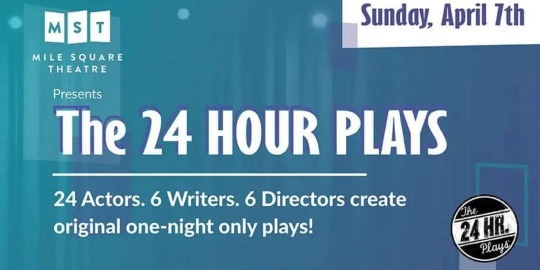
On April 7th, The 24 Hour Plays make their New Jersey debut at Hoboken's Mile Square Theatre. Established in 1995, The 24 Hour Plays are a non-profit theater company that bring creative communities together to write, rehearse and perform new plays and musicals in twenty-four hours.
“Mile Square Theatre and The 24 Hour Plays honor an abiding belief in the power of creative collaboration to develop transformative multicultural voices for the theater,” said Kevin R. Free, Artistic Director of Mile Square Theatre. “We're thrilled to be a partner to The 24 Hour Plays for its New Jersey premiere and host to a delightful mix of talents from New Jersey and New York City to make the program really sing.”
“The relationships artists build during formative theatre experiences like The 24 Hour Plays last their entire careers,” said producer Leo Layla Diaz. “We seek the very best cross-section of multi-generational and multi-cultural theater artists – and we arm them with what they need to hone their voices for this unique event."
Actors slated to participate include Gabriel Hernandez (Quarter Rican), Nirvaan Pal (School of Rock), Matt Lawler (“Station 11”, “Billions”), Kennedy Kanagawa (Into the Woods), Stephanie Kurtzuba (“The Irishman;” Wolf of Wall Street;” “Annie”), Joy Katharine Donze (Funny, Like an Abortion), DeAnna Supplee (B.R.O.K.E.N. code B.I.R.D switch.), Jason Yanto, Joelle Zazz, Maya Jeyam, Julia Way, Rich Frohman, David F. Gow (“The Girls on the Bus”), Jordan Ho, Grant Madison Stanton, Ross Cowan, Keivana Wallace (The Christmas Tree Farm) and Ian Lloyd Sanchez.
Writers include Susie Felber (Host/Producer "The Hawk"), DW Gregory (The Yellow Stocking Play, Radium Girls), Iraisa Ann Reilly (The Jersey Devil is a Papi Chulo), Pia Wilson (Black Bee), Marcus Scott (Sibling Rivalries), and Raakhee Mirchandani (JOURNEY TO THE STARS: KALPANA CHAWLA, ASTRONAUT). Directors include Julie Tucker, Rachel Dart (The Christmas Tree Farm) and Goldie Patrick (Paradise Blue). Musical Guests include Faye Chiao and Tasha Gordon-Solmon (Fountain of You). Additional artists to be announced.
Participating actors, writers, directors and production staff gather for the first time on the evening of Saturday, April 6th to introduce themselves and share prop and costume items they've been asked to bring. The writers will take inspiration from this meet and greet to write new plays overnight. In the morning, the actors and directors will receive the six new plays and team up with production staff to begin their rehearsal and tech process, with curtain at 7pm that night.
The 24 Hour Plays: Hoboken are produced by Leo Layla Diaz and Mark Armstrong in conjunction with Mile Square Theatre's Artistic Director Kevin R. Free. The event will honor the long-standing contributions of the Rostan Family to Mile Square Theatre with the dedication of the naming of the gallery space. Proceeds from The 24 Hour Plays: Hoboken will benefit Mile Square Theatre's non-profit theatre making and educational programming.
About The 24 Hour Plays
The 24 Hour Plays (est. 1995) bring together creative communities to produce plays and musicals written, rehearsed and performed in twenty-four hours. Through our radically present approach to theater, we make work that responds immediately to the world around us, builds communities and generates new artistic partnerships. Our events include The 24 Hour Plays on Broadway and The 24 Hour Musicals, as well as productions in Athens, Denver, Dublin, Finland, Florence, Germany, Little Rock, London, Los Angeles, Mexico City, Minneapolis, Philadelphia, Sacramento, San Francisco, Savannah and more. Beginning March 17 2020, The 24 Hour Plays Viral Monologues series generated over 600 new free-to-view theater pieces, featuring over 1000 artists, viewed millions of times worldwide and archived in the Library of Congress.
About Mile Square Theatre
Mile Square Theatre, a non-profit company, has been producing original and gently used theater since 2003 in Hoboken New Jersey. Located at 1400 Clinton Street in Hoboken, New Jersey, Mile Square Theatre enriches and engages the region through the year-round production and presentation of professional theatre and innovative arts education.
#marcus scott#marcusscott#write marcus#writemarcus#theater#theatre#playwrights#playwright#24hourplays#24hourplayshoboken
0 notes
Text
Art House Productions to Present 2024 INKubator New Play Festival
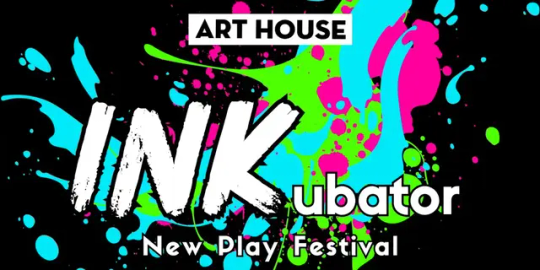
This year's playwrights are Upasna Barath, Amanda Sage Comerford, Leo Layla Díaz, Neil Levi, Dave Osmundsen, and Marcus Scott.
By: Chloe Rabinowitz
Apr. 02, 2024
Art House Productions has revealed the lineup for the 2024 INKubator New Play Festival from May 13-21. This year's playwrights are Upasna Barath, Amanda Sage Comerford, Leo Layla Díaz, Neil Levi, Dave Osmundsen, and Marcus Scott. Audiences who attend the festival will have the opportunity to participate in conversations with the writers, directors, and actors following each performance. All readings are free to attend, but advanced registration is required.
INKubator is a year-long generative process for a select group of six playwrights in residence at Art House Productions. During the program, playwrights meet on a monthly basis alongside program director Alex Tobey to share new work, receive feedback, and develop a first draft of a new play. The program culminates in the INKubator New Play Festival, where the playwrights work with professional directors and actors to hear the play read aloud for the first time. Casting will be announced at a later date.
"It's incredible to think six years have flown by since our first INKubator cohort in 2018," remarks program director Alex Tobey. "Since then, INKubator has nurtured 38 playwrights, with their works seen in readings and productions nationwide. I’m excited to showcase New Jersey's top playwrights once more, and unite artists and audiences to foster new play development in Jersey City."
The venue is ADA accessible. To request ASL interpreters or captions, please email [email protected] at least 2 weeks before the event.
For more information about the 2024 INKubator New Play Festival, please visit arthouseproductions.org.
FULL FESTIVAL SCHEDULE
Monday, May 13 at 7:00pm
Gore is for Girls
by Leo Layla Díaz
directed by Hannah Marie Pederson
You’re invited to Trinity’s Necromancy Party! She found a dead body in her backyard, and now she’s invited all her friends and others to resurrect the mystery man. Together they’ll celebrate the summer, play jump rope with the line between life and death, and try not to start the zombie apocalypse in Jersey City in this new play by Leo Layla Díaz.
Tuesday, May 14 at 7:00pm
couple goals
written and directed by Upasna Barath
After exchanging flirty messages on Instagram, two actors meet at a futuristic Malibu house for a romantic and creative getaway. As Ananya, a fresh-out-of-rehab TV actress, and Nathan, an award-winning performer, spend time in isolation with each other, reality unravels. In this drama with a surrealist twist, Ananya and Nathan realize the complexities of their relationship are inextricably tied to their industry.
Wednesday, May 15 at 7:00pm
We’d Rather Know If You Weren’t Coming Back
by Dave Osmundsen
directed by Mack Brown
In a seaside town called Crichton-by-the-Sea, a young Autistic woman becomes a tour guide for a local ghost tour company. As she and her fellow guides confront the literal and metaphorical ghosts that haunt them, sinister secrets arise that force them to reexamine their individual and collective mythologies. A new play about the places and people we haunt, and the people and places we allow to haunt us.
Monday, May 20 at 7:00pm
The Rip
by Neil Levi
directed by Isabel Perry
A coastal town on the edge of a vast ocean. Two teenage brothers defy their parents’ prohibition and head to the beach, where hostile locals and a menacing sea await them. When one brother returns home without the other, everything that’s held the family together threatens to fall apart. The Rip is about trying to find your way in the world when you don't know where or who you are, and the fine line between love and hate.
Tuesday, May 21 at 7:00pm
Talk to Me, Ocey Snead
by Amanda Sage Comerford
directed by Jessica Brater
In this bizarre yet true New Jersey tale of spectacle, scandal and betrayal, a bathtub drowning quickly becomes a murder mystery. As three sisters cloaked in black emerge as the prime suspects, local sleuths set out to discover not only what’s real, but what lies behind the veils.
Wednesday, May 22 at 7:00pm
Bizarro World
by Marcus Scott
directed by Martavius Parrish
A clique of young entrepreneurial computer programmers—all diversity hires at a Big Tech company in Silicon Valley—decide to strike out on their own by creating an innovative, one-of-kind simulated reality affinity space that comes complete with a truly revolutionary and singular artificial intelligence–powered virtual assistant. When a power grab commences and power players try getting ahold of the algorithm that will launch the group into the upper echelon of the tech world, they make a last-minute addition before launching. There’s just one thing they weren’t counting on and now all hell is about to break loose. Part office comedy, part sci-fi techno-thriller, Bizarro World explores machine learning, unlearning, the dualities of justice and injustice, equity and equality, visibility and representation, surveillance and over-policing in the digital age.
#marcus scott#marcusscott#write marcus#writemarcus#theatre#theater#playwrights#playwright#Arthouse Productions
0 notes
Text
The 24 Hour Plays Make NJ Debut at Mile Square Theatre
originally published: 03/27/2024
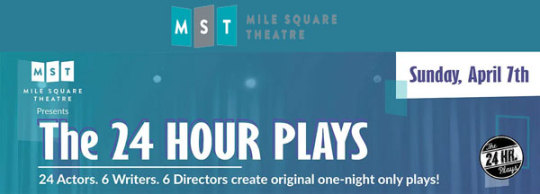
(HOBOKEN, NJ) -- On April 7, 2024, The 24 Hour Plays make their New Jersey debut at Hoboken's Mile Square Theatre. Established in 1995, The 24 Hour Plays are a non-profit theater company that bring creative communities together to write, rehearse and perform new plays and musicals in twenty-four hours. Showtime is 7:00pm.
“Mile Square Theatre and The 24 Hour Plays honor an abiding belief in the power of creative collaboration to develop transformative multicultural voices for the theater,” said Kevin R. Free, Artistic Director of Mile Square Theatre. “We’re thrilled to be a partner to The 24 Hour Plays for its New Jersey premiere and host to a delightful mix of talents from New Jersey and New York City to make the program really sing.”
“The relationships artists build during formative theatre experiences like The 24 Hour Plays last their entire careers,” said producer Leo Layla Diaz. “We seek the very best cross-section of multi-generational and multi-cultural theater artists – and we arm them with what they need to hone their voices for this unique event."
Actors slated to participate include Gabriel Hernandez (Quarter Rican), Nirvaan Pal (School of Rock), Matt Lawler (“Station 11”, “Billions”), Kennedy Kanagawa (Into the Woods), Stephanie Kurtzuba (“The Irishman;” Wolf of Wall Street;” “Annie”), Joy Katharine Donze (Funny, Like an Abortion), DeAnna Supplee (B.R.O.K.E.N. code B.I.R.D switch.), Jason Yanto, Joelle Zazz, Maya Jeyam, Julia Way, Rich Frohman, David F. Gow (“The Girls on the Bus”), Jordan Ho, Grant Madison Stanton, Ross Cowan, Keivana Wallace (The Christmas Tree Farm) and Ian Lloyd Sanchez.
Writers include Susie Felber (Host/Producer "The Hawk"), DW Gregory (The Yellow Stocking Play, Radium Girls), Iraisa Ann Reilly (The Jersey Devil is a Papi Chulo), Pia Wilson (Black Bee), Marcus Scott (Sibling Rivalries), and Raakhee Mirchandani (JOURNEY TO THE STARS: KALPANA CHAWLA, ASTRONAUT). Directors include Julie Tucker, Rachel Dart (The Christmas Tree Farm) and Goldie Patrick (Paradise Blue). Musical Guests include Faye Chiao and Tasha Gordon-Solmon (Fountain of You). Additional artists to be announced.
Advertise with New Jersey Stage for $50-$100 per month, click here for info
Participating actors, writers, directors and production staff gather for the first time on the evening of Saturday, April 6th to introduce themselves and share prop and costume items they’ve been asked to bring. The writers will take inspiration from this meet and greet to write new plays overnight. In the morning, the actors and directors will receive the six new plays and team up with production staff to begin their rehearsal and tech process, with curtain at 7:00pm that night.
The 24 Hour Plays: Hoboken are produced by Leo Layla Diaz and Mark Armstrong in conjunction with Mile Square Theatre’s Artistic Director Kevin R. Free. The event will honor the long-standing contributions of the Rostan Family to Mile Square Theatre with the dedication of the naming of the gallery space. Proceeds from The 24 Hour Plays: Hoboken will benefit Mile Square Theatre’s non-profit theatre making and educational programming.
Tickets start at $45 and are available for purchase online.
The 24 Hour Plays (est. 1995) bring together creative communities to produce plays and musicals written, rehearsed and performed in twenty-four hours. Through our radically present approach to theater, we make work that responds immediately to the world around us, builds communities and generates new artistic partnerships. Our events include The 24 Hour Plays on Broadway and The 24 Hour Musicals, as well as productions in Athens, Denver, Dublin, Finland, Florence, Germany, Little Rock, London, Los Angeles, Mexico City, Minneapolis, Philadelphia, Sacramento, San Francisco, Savannah and more. Beginning March 17 2020, The 24 Hour Plays Viral Monologues series generated over 600 new free-to-view theater pieces, featuring over 1000 artists, viewed millions of times worldwide and archived in the Library of Congress.
Mile Square Theatre, a non-profit company, has been producing original and gently used theater since 2003 in Hoboken New Jersey. Located at 1400 Clinton Street in Hoboken, New Jersey, Mile Square Theatre enriches and engages the region through the year-round production and presentation of professional theatre and innovative arts education.
Advertise with New Jersey Stage for $50-$100 per month, click here for info
#marcus scott#marcusscott#write marcus#writemarcus#black playwrights#theatre#theater#playwrights#playwright#black theatre#24hourplays#hoboken#24hourplayshoboken
0 notes
Text
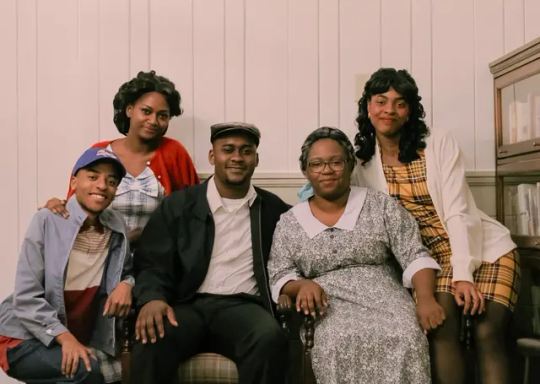
Artistic ways to mark Black History Month in Central Florida
By MATTHEW J. PALM | [email protected] | Orlando Sentinel
PUBLISHED: February 8, 2024 at 5:00 a.m. | UPDATED: February 9, 2024 at 3:22 p.m.
Loading your audio article
As the nation observes Black History Month, there are plenty of ways in Central Florida to mark the occasion artistically. The following plays, concerts and art exhibitions below shine a light on Black history, celebrate Black heritage or give voice to contemporary Black artists in writing, painting and musical composition.
The arts always provide food for thought; these offerings allow for reflection and celebration along with entertainment.
Theater
Playwrights’ Round Table, for the third year, presents its Black History Month Showcase. Six short plays by Black writers are included in the production, which runs Feb. 9-18 at Imagine Performing Arts Center in Oviedo Mall (tickets are $12-$20 at ImaginePerformingArtsCenter.org).
In Marcus Scott’s “Call and Response,” a young man is confronted after falsely sending emergency responders to someone as a joke, a practice called “swatting.” Michael Hagins contributed two works: the dark comedy “Man Bites Dog” and “First Date,” which is humorously described as “Making a connection can be hard, especially if your kids are assaulting Chuck E. Cheese.”Thao Tran and Chuck Roberson perform a scene from “Technical Support” by Amaris Gagnon, part of Playwrights’ Round Table’s Black History Month Showcase. (Courtesy Daniel Cooksley via Playwrights’ Round Table)
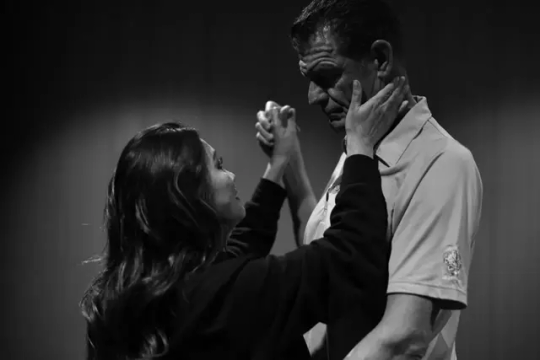
Amaris Gagnon also wrote two of the plays. “Mother of the Apocalypse” looks at a nurse at a fake abortion clinic, and “Technical Support” asks where lonely people come from.
Finally, in Krystle Dellihue’s “White Coat,” a young man on the cusp of achieving his dreams suddenly has to make a very difficult decision with his girlfriend. The cast of “A Raisin in the Sun” at Rollins College prepares for the production with a West African movement and traditions workshop from Julie Coleman.
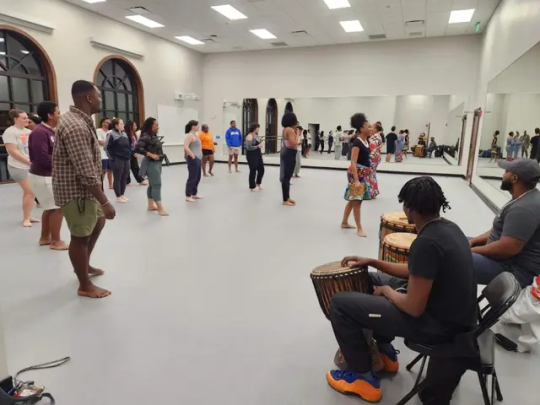
(Courtesy Rollins College) Rollins College in Winter Park presents a classic title with “A Raisin in the Sun” taking the stage at the Annie Russell Theatre Feb. 16-24 ($20, rollins.edu/annie). Lorraine Hansberry’s 1959 masterpiece follows a multigenerational Black family as it navigates prejudice. Felichia Chivaughn directs.
Turning to African heritage, the MAC Boys tackle “Ruined,” Lynn Nottage’s Pulitzer Prize-winning play set during civil war in the Democratic Republic of Congo, where strong Mama Nadi owns a bar that draws characters from different sides of the conflict. The play will be performed at Orlando Family Stage, where the MAC Boys spotlight stories and works of and by people of color. It runs Feb. 22-25 with tickets ($20) at OrlandoFamilyStage.com.Julian Brown plays the djembe, an African drum, in Orlando Family Stage’s “Giraffes Can’t Dance.” (Courtesy Michael Cairns via Orlando Family Stage)
Also at Orlando Family Stage is the theater’s own production of “Giraffes Can’t Dance” for youngsters and their families. Based on the children’s book by Giles Andreae, the show is set on the African savannah and features a look at African musical heritage. Julian Brown plays the show’s djembe drummer; the djembe is a goblet-style drum originally from West Africa.
The show itself, adapted by Black playwright Gloria Bond Cunie, is a sweet look at feeling different and friendship as African animals prepare for a big dance. Director Ke’Lee Pernell leads the creative team for “Giraffes Can’t Dance,” which runs through Feb. 25. Get tickets ($15 and up) at OrlandoFamilyStage.com — and check out the theater’s ongoing salute to Black playwrights at Facebook.com/OrlandoFamilyStage.
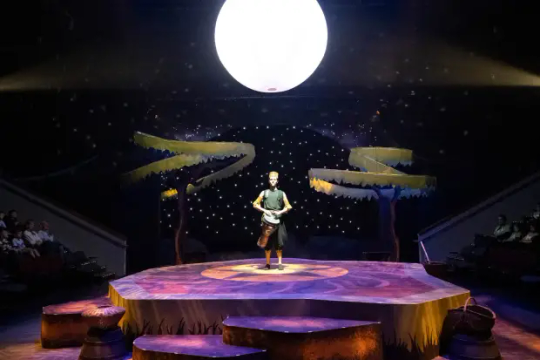
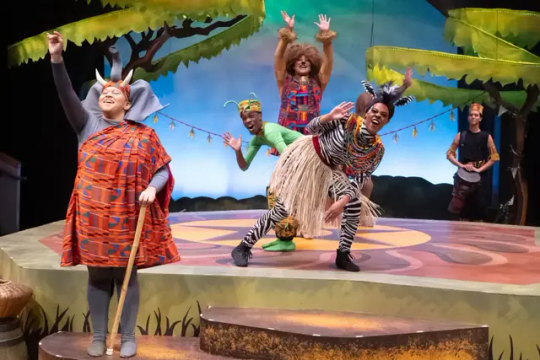
Joy Allen, from left, Adourin Jamelle Owens, Jordan Sophia, Dayla Carroll and Julian Brown star in “Giraffes Can’t Dance” at Orlando Family Stage. (Courtesy Michael Cairns via Orlando Family Stage)
Music
The Sanford Jazz Ensemble salutes Black musicians in its Black History Month Concert at 3 p.m. Feb. 11 at the Ritz Theater in Sanford. Featured singer Ron Stark will perform Motown songs by Marvin Gaye, Smokey Robinson, The Four Tops and The Temptations, while the band will play songs by Michael Jackson, Grover Washington, Earth Wind & Fire and Tower of Power. Tickets ($27.50) are available at ritztheatersanford.com.
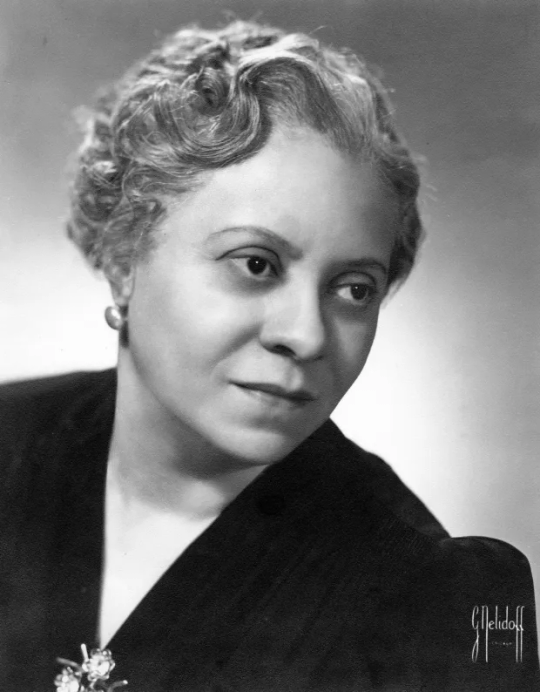
The 89th Bach Festival will acknowledge a significant moment in Black artistic history when its orchestra performs Florence Price’s Symphony No. 1 in E minor as part of its “Sanctuary Road” program Feb. 17-18 (tickets $15 and up; bachfestivalflorida.org). When the Chicago Symphony Orchestra played the work in 1933, it was the first time a symphony composed by an African American woman was performed by a major American orchestra.Composer and musician Florence Price, photographed by G. Nelidoff in Chicago, Illinois. (Courtesy University of Arkansas Libraries)
As for “Sanctuary Road,” it highlights a grimmer era of Black history. That work by composer Paul Moravec and librettist Mark Campbell sets the stories of enslaved Americans to music. It’s based on William Still’s 1872 book of slave narratives, “The Underground Railroad.”
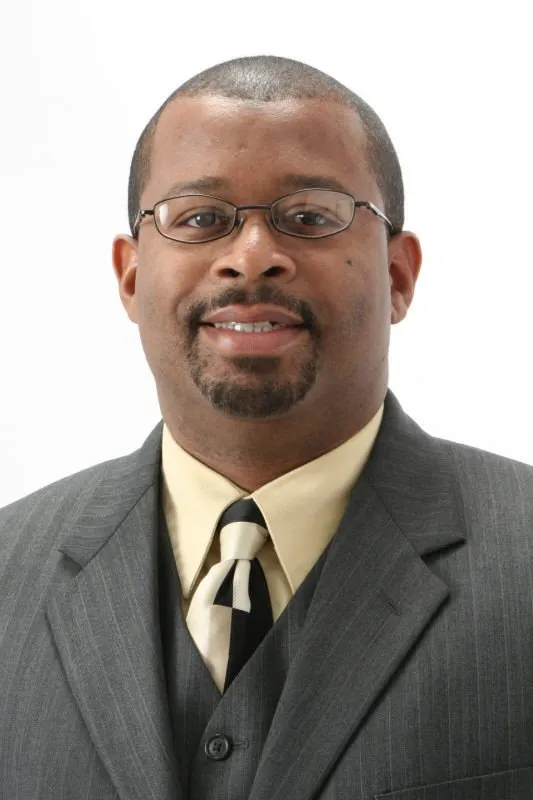
Composer James Lee III was inspired by a more modern moment in Black history, the Rev. Martin Luther King’s “I Have a Dream Speech.” His “Shades of Unbroken Dreams,” written 60 years after King’s famed 1963 speech, is part of the Orlando Philharmonic Orchestra’s “Brahms Third Symphony” program Feb. 24-25.Composer James Lee III was inspired by Martin Luther King’s “I Have a Dream Speech.” (Orlando Sentinel file photo)
“Shades of Unbroken Dreams,” co-commissioned by the Philharmonic, is making its Florida premiere in the Steinmetz Hall performance (tickets: $20 and up at drphillipscenter.org). Composer Lee even matched the cadence of King’s speech in parts of the music.
“For me, this ‘I Have a Dream’ speech and this concerto is really a vehicle through the arts that can really stimulate one to think about what is their role?” Lee told the BBC about the work. “How can they participate in helping to achieve this dream 60 years later?”
Timucua Arts Foundation will present “Timucua Amplifies Black Voices,” a weekend of music and spoken word, Feb. 16-18 at its venue, 2000 S. Summerlin Ave. in Orlando. Performers include Solomon Jaye, Britton Rene Collins, Brandon Martin, the Jarred Armstrong Trio and the DeAndre Lettsome Quartet.
Jaye is a vocalist and high-energy tap dancer, while Collins combines pantomime, poetry, gesture and improvisation in theatrical percussion performance. Martin will present a vocal recital, “Voices of Justice.”
Get more information on the individual performances and tickets at timucua.com/events/tag/black-history-month.
Art
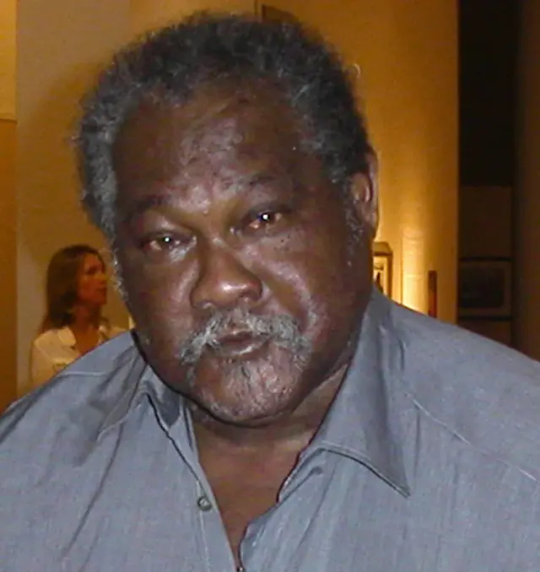
Orlando City Hall’s Terrace Gallery will host a Black History Month art exhibition through March 31, featuring works by African Americans. From 10-11:30 a.m. Feb. 12 the public is invited to meet some of the artists. Regular gallery hours are 8 a.m.-9 p.m. weekdays, noon-5 p.m. Saturdays and Sundays. The gallery is on the first floor of city hall, 400 S. Orange Ave. and admission is free, 12-5 p.m. Saturday and Sunday.Purvis Young is among the artists on view at the Mennello Museum of American Art in Orlando. (Orlando Sentinel file photo courtesy of Skot Foreman)
And finally, the city’s Mennello Museum of American Art is currently exhibiting “Self-Taught Black Artists in the American South.” Thirteen artists are featured in the exhibition, which highlights examples from the Mennello’s permanent collection alongside works from a 2023 acquisition from the Polk Museum of Art. Artists represented in paintings and sculpture include Mary Proctor, Alyne Harris, Purvis Young, Jesse Aaron and Mose Toliver.
The Mennello Museum, at 900 E. Princeton St. in Orlando, is open 10:30 a.m.-4:30 p.m. Tuesdays-Saturdays, noon-4:30 p.m. Sundays. Admission is $5 or less. Get more information at mennellomuseum.org.
Follow me at facebook.com/matthew.j.palm or email me at [email protected]. Find more entertainment news at OrlandoSentinel.com/entertainment

#marcus scott#marcusscott#write marcus#writemarcus#black playwrights#theatre#theater#playwrights#playwright#black theatre#call and response
0 notes
Text
ART HOUSE PRODUCTIONS ANNOUNCES 2023-2024 INKUBATOR PLAYWRIGHTS COHORT
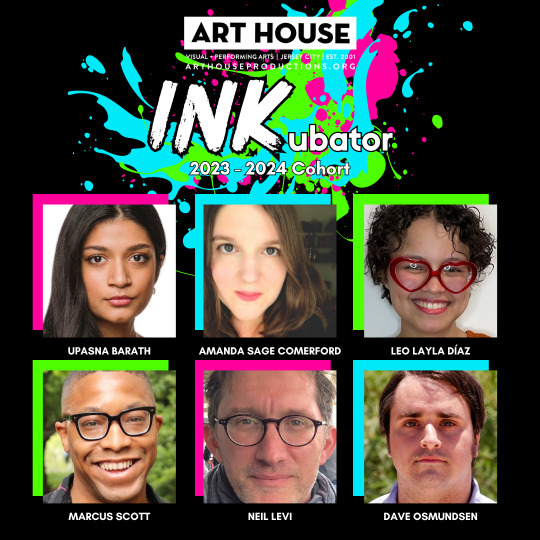
Posted on October 4, 2023 by Editor
Art House Productions is proud to announce the 2023-2024 cohort of its INKubator Program. INKubator is a year-long generative process for a select group of 6 playwrights in residence at Art House Productions. This year’s playwrights are Upasna Barath, Amanda Sage Comerford, Leo Layla Díaz, Neil Levi, Dave Osmundsen, and Marcus Scott. Playwrights will meet monthly alongside program director Alex Tobey to share new work, receive feedback, and develop a first draft of a new play. In the spring, each writer will team up with a director and actors to present a public reading as a part of Art House Productions’ INKubator New Play Festival scheduled for May 2024. Audiences who attend the festival will have the opportunity to participate in conversations with the writers, directors, and actors following each performance.
INKubator playwrights will be the first cohort to meet full-time in Art House Productions’ new theater inside the Hendrix, at 345 Marin Boulevard between Bay Street and Morgan Street. In addition to official INKubator programming, playwrights will also have the ability to utilize the space for meetings, rehearsals, and readings.
Submissions were evaluated through a process coordinated by INKubator Program Director, Alex Tobey, in partnership with INKubator alum playwrights Iraisa Ann Reilly and Micharne Cloughley, and Art House Productions’ Associate Executive Director, Anna Gundersen.
The following finalists were also honored in this year’s submission process: Phillip Gregory Burke, Lauren D’Errico, Kevin T. Durfee, Joseph Gallo, Lizz Mangan, Kyle Mazer, Frank Murdocco, and M. D. Schaffer.
Anna Gundersen, Associate Executive Director of Art House Productions, says, “This year’s INKubator cohort is an exciting group of talented playwrights who pitched unique and thoughtful plays to develop. INKubator is a program that began at Art House in 2018, and under the leadership of Alex Tobey, it continues to grow. We look forward to supporting these artists during their play development residency and in the future.”
0 notes
Text
Art House Productions Announces 2023-2024 INKubator Playwrights
originally published: 10/04/2023

(JERSEY CITY, NJ) -- Art House Productions has announced the 2023-2024 cohort of its INKubator Program. INKubator is a year-long generative process for a select group of 6 playwrights in residence at Art House Productions. This year's playwrights are Upasna Barath, Amanda Sage Comerford, Leo Layla Díaz, Neil Levi, Dave Osmundsen, and Marcus Scott.
Playwrights will meet monthly alongside program director Alex Tobey to share new work, receive feedback, and develop a first draft of a new play. In the spring, each writer will team up with a director and actors to present a public reading as a part of Art House Productions' INKubator New Play Festival scheduled for May 2024. Audiences who attend the festival will have the opportunity to participate in conversations with the writers, directors, and actors following each performance.
INKubator playwrights will be the first cohort to meet full-time in Art House Productions’ new theater inside the Hendrix, at 345 Marin Boulevard between Bay Street and Morgan Street. In addition to official INKubator programming, playwrights will also have the ability to utilize the space for meetings, rehearsals, and readings.
Submissions were evaluated through a process coordinated by INKubator Program Director, Alex Tobey, in partnership with INKubator alum playwrights Iraisa Ann Reilly and Micharne Cloughley, and Art House Productions’ Associate Executive Director, Anna Gundersen.
The following finalists were also honored in this year’s submission process: Phillip Gregory Burke, Lauren D'Errico, Kevin T. Durfee, Joseph Gallo, Lizz Mangan, Kyle Mazer, Frank Murdocco, and M. D. Schaffer.
Advertise with New Jersey Stage for $50-$100 per month, click here for info
Anna Gundersen, Associate Executive Director of Art House Productions, says, “This year’s INKubator cohort is an exciting group of talented playwrights who pitched unique and thoughtful plays to develop. INKubator is a program that began at Art House in 2018, and under the leadership of Alex Tobey, it continues to grow. We look forward to supporting these artists during their play development residency and in the future.”
Art House Productions is currently in rehearsal for the New Jersey premiere of Tracy Jones by INKubator alum Stephen Kaplan, which received early development during INKubator and was first presented at the 2019 INKubator New Play Festival. Tracy Jones is the first full production to be presented in Art House Productions’ new state-of-the-art theater and the first play developed in INKubator to receive a full production at Art House. Tracy Jones is a touching comedy that runs at Art House Productions from October 19 - November 5, 2023. Alex Tobey directs. Tickets are currently on sale at arthouseproductions.org.
2023-2024 INKubator Writers
Upasna Barath(she/they) is a queer South Asian writer, actress, and producer based in Brooklyn, New York, but originally from Naperville, Illinois. She began her writing career as an essayist, publishing work for Rookie Mag. In college, Upasna wrote her first play, "The Choice is Yours," which was runner-up for the 2019 Judith Barlow Prize. Her acting credits include Natalie in Lucy Kirkwood’s "Mosquitoes" (Steep Theatre) and Sarita in Sharyn Rothstein’s "Right to Be Forgotten" (West Virginia Public Theatre). She was awarded the 2020/21 Steppenwolf Theatre Literary Apprenticeship and Fellowship. Recently, she co-wrote, co-produced, and was a lead actress in her comedic coming-of-age short film "Little Sl*t," which is currently in post-production. She received a B.A. in Economics and a B.A. in Theatre from North Central College. She also has an MS in Leadership for Creative Enterprises from Northwestern University.
Amanda Sage Comerford (she/her) is a New Jersey playwright who wrote her first play about an elderly woman’s rabid dog when she was seven. Since then, her plays have had productions and readings at Premiere Stages, Luna Stage, Chester Theatre Group, Chatham Players, The Actors Studio of Newburyport, The Red Room, and Under St. Mark’s Theatre. She has also participated in CODE Red: An Evening of Monologues with TSquared Production Co. and Voting Writes with Luna Stage. Amanda received her BFA in Dramatic Writing from Purchase College.
Leo Layla Díaz (they/them) is a Jersey playwright, dramaturg, and teaching artist, a recent graduate of The New School’s BFA Drama program, and completing their MA in arts management. Their recent plays include Orbiting Something at The 24 Hour Plays: Nationals 2023 (off-Broadway, NYC), Trophy Boys at The New School and The Tank (NYC), and Roleplay in 2023 at The Chain Theatre (NYC). Díaz’s writing has also been performed at Rebel Verses (Vineyard Theater, NYC), The 24 Hour Plays: Viral Monologues (NYC), Brave New Voices (Houston & Las Vegas), Louder Than a Bomb (NJ), Performance Anxiety Inc (WI), and Berg Originals (PA). They’ve been a Dramatists Guild member since 2022. Díaz’s work focuses on identity, myth, and legend, being mediocre at Spanish, queer people who never left their emo phase, and glitter.
Neil Levi’sfirst play, Kin, won the 2015 Patrick White Playwright’s Award in Australia and was presented in a staged reading at the Sydney Theater Company. He has since written plays on such topics as ultra-leftist political violence in the 1970s, doping in competitive swimming, the Jewish community in apartheid South Africa, and inherited family trauma. He received a BA in English and Philosophy from the University of Western Australia, an MA, MPhil, and PhD in English and Comparative Literature from Columbia University. For many years he was a Professor of English at Drew University in Madison, NJ. Playwriting courses at ESPA Primary Stages and Pataphysics at the Flea. A long-time resident of Jersey City, he is thrilled and honored to be part of this year’s INKubator cohort.
Dave Osmundsen (He/Him/His) is an Autistic playwright and dramaturg whose work has been seen and developed at KCACTF Region 8, the Kennedy Center/NNPN MFA Playwrights Workshop, the Great Plains Theatre Conference, Purple Crayon Players, B Street Theatre, the William Inge Theatre Festival, the Midwest Dramatists Conference, Phoenix Theatre Company, Clamour Theatre Company, Premiere Stages, the Valdez Theatre Conference, and more. A two-time O’Neill semifinalist, he was a recipient of the Blank Theatre and Ucross Foundation’s inaugural Future of Playwriting Prize. His play Light Switch was the 2021 Distinguished Achievement recipient of the Jean Kennedy Smith Playwriting Award, an Honorable Mention finalist for BAPF 2021, longlisted for the Theatre503 International Playwriting Award, and a finalist for the 2020 Carlo Annoni Playwriting Prize. Light Switch received its world premiere at Spectrum Theatre Ensemble in 2022. His play More of a Heart will receive its world premiere at BLUEBARN Theatre in March 2024. His plays have been published by The Dionysian, Canyon Voices, Exposition Review, Fresh Words: Contemporary One Act Plays Volume 5, and Broadway Play Publishing. MFA: Arizona State University.
Marcus Scott is a playwright, musical theatre writer & journalist. Full-length works: Tumbleweed (finalist: 2017 BAPF & the 2017 Festival of New American Plays at Austin Playhouse; semifinalist: 2022 O’Neill NPC, 2022 Blue Ink Playwriting Award & 2017 New Dramatists Princess Grace Award in Playwriting Fellowship), Sibling Rivalries (finalist: Normal Ave’s NAPseries, 2021 Seven Devils Playwrights Conference & 2021 ATHE-KCACTF Judith Royer Excellence In Playwriting Award; semifinalist: 2022 Lanford Wilson New American Play Festival, 2021 Blue Ink Playwriting Award & 2021 New Dramatists Princess Grace Award in Playwriting Fellowship; long-listed: 2020 Theatre503 International Playwriting Award), There Goes The Neighborhood (finalist: 2023 New Dramatists Princess Grace Award in Playwriting Fellowship, 2023 Blue Ink Playwriting Award, the 2019 Bushwick Starr Reading Series; semifinalist: 2023 BAPF) & Cherry Bomb (recipient: 2017 Drama League First Stage Artist-In-Residence, 2017 New York Theatre Barn's New Works Series; 2017 finalist for the Yale Institute for Music Theatre). Heartbeat Opera commissioned Scott to adapt Beethoven’s “Fidelio” (Co-writer; Met Live Arts at the MET Museum, Mondavi Center at UC Davis, Scottsdale Center for the Performing Arts, The Broad Stage, Rutgers Presbyterian Church, Baruch Performing Arts Center; NYTimes Critics’ Pick! ★★★★). Scott is the recipient of the WTP Rosalind Ayres-Williams Memorial Scholarship (2022-2024). His one-act Sundown Town is published in Obsidian: Literature and Arts of the African Diaspora: Issue: 48.1.
His work has developed or presented at Concord Theatricals/Sam French OOB Short Play Festival, Queens Theatre (New American Voices series), The Fire This Time Festival, Zoetic Stage (Finstrom Festival Of New Work), Dixon Place, Feinstein's/54 Below, Abingdon Theatre Company, Downtown Urban Arts Festival, Classical Theatre of Harlem, Across A Crowded Room at Lincoln Center Performing Arts Library (NYPL), Musical Theater Factory's 4x15 Series, Space on Ryder Farm, Theatre West, New Circle Theatre Company, MicroTheater Miami, Columbia College Chicago, among others. Scott is a 2021 NYSAF Founders’ Award finalist, a 2021 Doric Wilson Independent Playwright Award semifinalist, a four-time National Black Theatre I AM SOUL Playwrights Residency finalist, and a four-time top finalist for The Civilians R&D Group. His articles appeared in Architectural Digest, Time Out New York, American Theatre Magazine, Playbill, Elle, Out, Essence, and The Brooklyn Rail, among others. BFA: State University College at Buffalo, MFA: NYU Tisch.
Art House Productions is a 501(c)(3) nonprofit organization committed to the development and presentation of the performing and visual arts in Jersey City, NJ. Art House Productions presents theater, performing and visual arts festivals, arts events, visual art exhibitions, and adult and youth art classes.
Art House Productions is generously supported by The New Jersey State Council on the Arts, SILVERMAN, The Princeton Foundation, The New Jersey Theatre Alliance, The Hudson County Office of Cultural Affairs, and the Alliance of Resident Theatres / New York.
#marcus scott#marcusscott#write marcus#writemarcus#theatre#theater#playwrights#playwriting#playwright#writers#Art House#Art House Productions
0 notes
Text
Art House Productions Reveals 2023-2024 Cohort of its INKubator Program
Each writer will team up with a director and actors to present a public reading as a part of Art House Productions' INKubator New Play Festival scheduled for May 2024.
By: Stephi Wild
Oct. 04, 2023
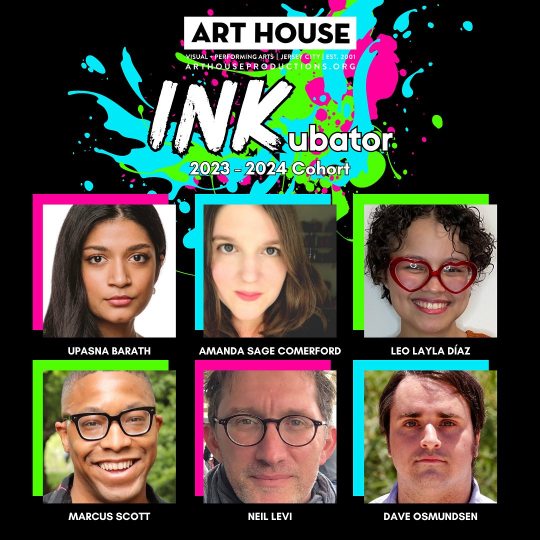
Art House Productions has announced the 2023-2024 cohort of its INKubator Program. INKubator is a year-long generative process for a select group of 6 playwrights in residence at Art House Productions. This year's playwrights are Upasna Barath, Amanda Sage Comerford, Leo Layla Díaz, Neil Levi, Dave Osmundsen, and Marcus Scott. Playwrights will meet monthly alongside program director Alex Tobey to share new work, receive feedback, and develop a first draft of a new play. In the spring, each writer will team up with a director and actors to present a public reading as a part of Art House Productions' INKubator New Play Festival scheduled for May 2024. Audiences who attend the festival will have the opportunity to participate in conversations with the writers, directors, and actors following each performance.
INKubator playwrights will be the first cohort to meet full-time in Art House Productions’ new theater inside the Hendrix, at 345 Marin Boulevard between Bay Street and Morgan Street. In addition to official INKubator programming, playwrights will also have the ability to utilize the space for meetings, rehearsals, and readings.
Submissions were evaluated through a process coordinated by INKubator Program Director, Alex Tobey, in partnership with INKubator alum playwrights Iraisa Ann Reilly and Micharne Cloughley, and Art House Productions’ Associate Executive Director, Anna Gundersen.
The following finalists were also honored in this year’s submission process: Phillip Gregory Burke, Lauren D'Errico, Kevin T. Durfee, Joseph Gallo, Lizz Mangan, Kyle Mazer, Frank Murdocco, and M. D. Schaffer.
Anna Gundersen, Associate Executive Director of Art House Productions, says, “This year’s INKubator cohort is an exciting group of talented playwrights who pitched unique and thoughtful plays to develop. INKubator is a program that began at Art House in 2018, and under the leadership of Alex Tobey, it continues to grow. We look forward to supporting these artists during their play development residency and in the future.”
#marcus scott#marcusscott#write marcus#writemarcus#theater#theatre#playwrights#writers#Art House#Art House Productions
0 notes
Text
There Goes The Neighborhood workshop with The Elif Collective

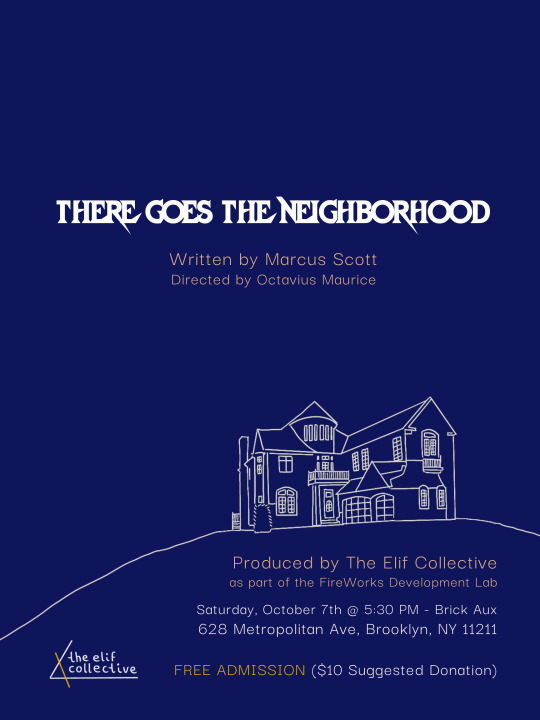
#marcus scott#marcusscott#write marcus#writemarcus#black playwrights#theatre#theater#lgbt#lgbtq#black conservative perspective#black conservative republicans#black conservatives#black republicans#all lives matter#black lives matter#slasher#slashers#horror plays
0 notes